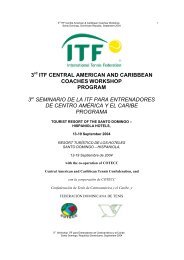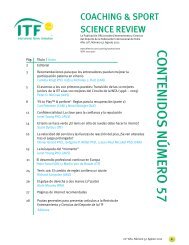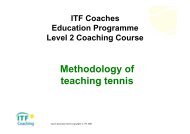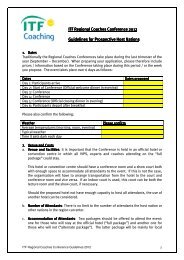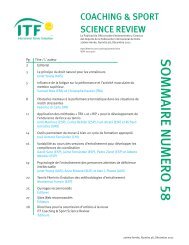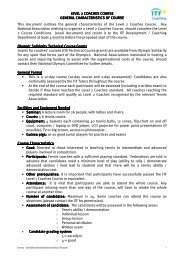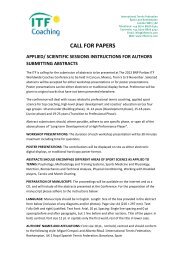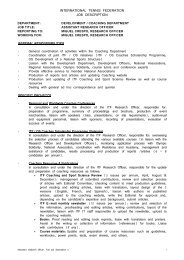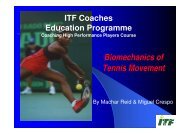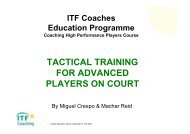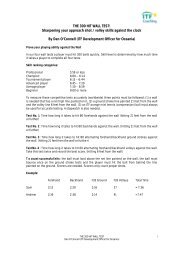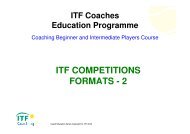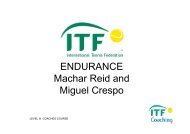summary of presentations resumen de las ... - Coaching - ITF
summary of presentations resumen de las ... - Coaching - ITF
summary of presentations resumen de las ... - Coaching - ITF
You also want an ePaper? Increase the reach of your titles
YUMPU automatically turns print PDFs into web optimized ePapers that Google loves.
2 nd <strong>ITF</strong> Central American & Caribbean Coaches Workshop<br />
Fort Lau<strong>de</strong>rdale, FL, USA, September 2002<br />
International Tennis Fe<strong>de</strong>ration<br />
Fe<strong>de</strong>ración Internacional <strong>de</strong> Tenis<br />
2 nd <strong>ITF</strong> Central American &<br />
Caribbean Coaches Workshop<br />
2 nd Seminario <strong>de</strong> la <strong>ITF</strong> para<br />
entrenadores <strong>de</strong> Centro América y el<br />
Caribe<br />
Fort Lau<strong>de</strong>rdale, FL, USA, September 2002<br />
Fort Lau<strong>de</strong>rdale, FL, USA, SeptIembre 2002<br />
SUMMARY<br />
OF<br />
PRESENTATIONS<br />
RESUMEN<br />
DE LAS<br />
PRESENTACIONES<br />
2 nd Seminario <strong>de</strong> la <strong>ITF</strong> para entrenadores <strong>de</strong> Centro América y el Caribe<br />
Fort Lau<strong>de</strong>rdale, FL, USA, Septiembre 2002<br />
1<br />
1
2 nd <strong>ITF</strong> Central American & Caribbean Coaches Workshop<br />
Fort Lau<strong>de</strong>rdale, FL, USA, September 2002<br />
Contents<br />
Contenidos<br />
Programme<br />
Programa<br />
Bios <strong>of</strong> Speakers<br />
Biografías <strong>de</strong> los ponentes<br />
Singles tactics for fast courts (C)<br />
Tácticas <strong>de</strong> indivi duales para canchas rápidas (C)<br />
Doug MacCurdy<br />
Learning and incorporating advanced volleying (C)<br />
Apren<strong>de</strong>r y adoptar un juego <strong>de</strong> volea avanzado (C)<br />
Doug MacCurdy<br />
Specifity in training using the serve as an example (C)<br />
Especificidad en el entrenamiento con el saque como ejemplo (C)<br />
Doug MacCurdy<br />
Progressive Development <strong>of</strong> a world c<strong>las</strong>s player (S)<br />
Desarrollo progresivo <strong>de</strong> un jugador <strong>de</strong> nivel mundial (S)<br />
Nick Saviano<br />
Grassroots tennis and schools tennis in Catalunya (S)<br />
Tenis <strong>de</strong> base y tenis en los colegios en Cataluña (S)<br />
Álvaro Margets<br />
On court work with players 14 and un<strong>de</strong>r (C)<br />
Trabajo en cancha con jugadores <strong>de</strong> hasta 14 años (C)<br />
Álvaro Margets<br />
On court work with players 18 and un<strong>de</strong>r (C)<br />
Trabajo en cancha con jugadores <strong>de</strong> hasta 18 años (C)<br />
Álvaro Margets<br />
On court work with pr<strong>of</strong>essional tennis players (C)<br />
Trabajo en cancha con jugadores pr<strong>of</strong>esionales (C)<br />
Álvaro Margets<br />
Differences between playing on clay and on fast courts (C)<br />
Diferencias entre el juego en arcilla y en cancha rápida (C)<br />
Álvaro Margets<br />
<strong>Coaching</strong> Tennis the Albert Einstein way (C)<br />
Enseñanza <strong>de</strong>l tenis al estilo <strong>de</strong> Albert Einstein (C)<br />
Lew Brewer<br />
Game based approach applied to tennis coaching (C)<br />
El enfoque basado en el juego aplicado a la enseñanza <strong>de</strong>l tenis (C)<br />
Miguel Crespo, Gustavo Granito<br />
Methods for analyzing and helping the player improve (C)<br />
Métodos <strong>de</strong> análisis y mejora <strong>de</strong>l jugador (C)<br />
Miguel Crespo<br />
Talent I<strong>de</strong>ntification (S)<br />
I<strong>de</strong>ntificación <strong>de</strong> talentos (S)<br />
Paul Roetert<br />
Important concepts in tennis coaching (C)<br />
Conceptos importantes en la enseçanza <strong>de</strong>l tenis (C)<br />
Dave Miley, Miguel Crespo<br />
<strong>ITF</strong> Development Update / Rating the tennis world (S)<br />
Actualización sobre <strong>de</strong>sarrollo <strong>de</strong>l tenis mundial / C<strong>las</strong>ificación <strong>ITF</strong> (S)<br />
Dave Miley<br />
2 nd Seminario <strong>de</strong> la <strong>ITF</strong> para entrenadores <strong>de</strong> Centro América y el Caribe<br />
Fort Lau<strong>de</strong>rdale, FL, USA, Septiembre 2002<br />
Page<br />
Página<br />
3<br />
6<br />
9<br />
12<br />
13<br />
14<br />
15<br />
16<br />
18<br />
21<br />
23<br />
25<br />
26<br />
27<br />
30<br />
31<br />
32<br />
2<br />
2
2 nd <strong>ITF</strong> Central American & Caribbean Coaches Workshop<br />
Fort Lau<strong>de</strong>rdale, FL, USA, September 2002<br />
Monday, 9 September / Lunes, 9 Septiembre<br />
PROGRAM<br />
PROGRAMA<br />
Arrival <strong>of</strong> <strong>de</strong>legates in Fort Lau<strong>de</strong>rdale<br />
Llegada <strong>de</strong> participantes a Fort Lau<strong>de</strong>rdale<br />
20.00 Welcome dinner and Introduction to the workshop<br />
Cena <strong>de</strong> bienvenida y presentación <strong>de</strong>l Sem inario<br />
Tuesday, 10 September / Martes, 10 <strong>de</strong> Septiembre<br />
08.45 – 09.00 Workshop Introduction (S)<br />
Introducción al Seminario (S)<br />
Gustavo Granitto, Miguel Crespo<br />
09.00 - 10.15 Singles Tactics for Fast Courts (C)<br />
Tácticas <strong>de</strong> individuales para canchas rápidas (C)<br />
Doug MacCurdy<br />
10.15 – 10.45 Break / Pausa<br />
10.45 - 12.00 Working anticipation with young players in PTA (C)<br />
Como se trabaja la anticipación con Jóvenes jugadores en PTA (C)<br />
Gustavo Granitto, Nicolás Guízar<br />
12.15 – 13.30 Development <strong>of</strong> coordination and speed on court I (C)<br />
Desarrollo <strong>de</strong> la coordinación y la velocidad en cancha I (C)<br />
Hugo Giménez<br />
13.30 - 15.00 Lunch and free time / Almuerzo y tiempo libre<br />
Demo test Gamma-Fischer<br />
15.00 - 16.15 Progressive Development <strong>of</strong> a world c<strong>las</strong>s player (S)<br />
Desarrollo progresivo <strong>de</strong> un jugador <strong>de</strong> nivel mundial (S)<br />
Nick Saviano<br />
16.30 - 17.45 Grassroots tennis and schools tennis in Catalunya (S)<br />
Tenis <strong>de</strong> base y tenis en los colegios en Cataluña (S)<br />
Álvaro Margets<br />
20.00 Opening dinner / Cena <strong>de</strong> Apertura<br />
Wednesday, 11 September / Miércoles, 11 <strong>de</strong> Septiembre<br />
09.00 - 10.15 On court work with players 14 and un<strong>de</strong>r (C)<br />
Trabajo en cancha con jugadores <strong>de</strong> hasta 14 años (C)<br />
Álvaro Margets<br />
10.15 - 10.45 Break / Pausa<br />
10.45 - 12.00 <strong>Coaching</strong> Tennis the Albert Einstein way (C)<br />
Enseñanza <strong>de</strong>l tenis al estilo <strong>de</strong> Albert Einstein (C)<br />
Lew Brewer<br />
2 nd Seminario <strong>de</strong> la <strong>ITF</strong> para entrenadores <strong>de</strong> Centro América y el Caribe<br />
Fort Lau<strong>de</strong>rdale, FL, USA, Septiembre 2002<br />
3<br />
3
2 nd <strong>ITF</strong> Central American & Caribbean Coaches Workshop<br />
Fort Lau<strong>de</strong>rdale, FL, USA, September 2002<br />
12.15 – 13.30 Learning and Incorporating Advanced Volleying - Part 1 (C)<br />
Apren<strong>de</strong>r y adoptar un juego <strong>de</strong> volea avanzado - Parte 1 (C)<br />
Doug MacCurdy<br />
13.30 - 15.00 Lunch and free time / Almuerzo y tiempo libre<br />
15.00 - 16.30 Development <strong>of</strong> coordination and speed on court II (C)<br />
Desarrollo <strong>de</strong> la coordinación y la velocidad en cancha II (C)<br />
Hugo Giménez<br />
16.45 - 18.15 Round Table: Cecilia Ancalmo The Schools Tennis Initiative Program<br />
National STI Coordinators (S)<br />
Mesa Redonda: Cecilia Ancalmo. El programa <strong>de</strong>l tenis en <strong>las</strong> Escue<strong>las</strong>.<br />
Coordinadores Nacionales STI (S)<br />
Thursday, 12 September / Jueves, 12 <strong>de</strong> Septiembre<br />
09.00 - 10.00 Learning and Incorporating Advanced Volleying - Part 2 (C)<br />
Apren<strong>de</strong>r y adoptar un juego <strong>de</strong> volea avanzado - Parte 2 (C)<br />
Doug MacCurdy<br />
10.00 - 10.30 Break / Pausa<br />
10.30 - 11.30 On court work with players 18 and un<strong>de</strong>r (C)<br />
Trabajo en canc ha con jugadores <strong>de</strong> hasta 18 años (C)<br />
Álvaro Margets<br />
11.45 - 12.45 Computer - the Future <strong>of</strong> Tennis Teaching and Match Play (C)<br />
La computadora – El Futuro <strong>de</strong> la Enseñanza y <strong>de</strong>l Tenis (C)<br />
Enzo Rais<br />
Free afternoon in Fort Lau<strong>de</strong>rdale / Tar<strong>de</strong> libre en Fort Lau<strong>de</strong>rdale<br />
Friday, 13 September / Viernes, 13 <strong>de</strong> Septiembre<br />
09.00 - 10.15 Game based approach applied to tennis coaching (C)<br />
El enfoque basado en el juego aplicado a la enseñanza <strong>de</strong>l tenis (C)<br />
Miguel Crespo, Gustavo Granitto<br />
10.15 - 10.45 Break / Pausa<br />
10.45 - 12.00 Specificity in Training Utilizing the Serve as an Example (C)<br />
Especificidad en el entrenamiento con el saque como ejemplo (C)<br />
Doug MacCurdy<br />
12.15 - 13.30 On court work with pr<strong>of</strong>essional tennis players (C)<br />
Trabajo en cancha con jugadores pr<strong>of</strong>esionales (C)<br />
Álvaro Margets<br />
13.30 - 15.00 Lunch and free time / Almuerzo y tiempo libre<br />
15.00 - 16.15 Talent I<strong>de</strong>ntification (S)<br />
I<strong>de</strong>ntificación <strong>de</strong> talentos (S)<br />
Paul Roetert<br />
2 nd Seminario <strong>de</strong> la <strong>ITF</strong> para entrenadores <strong>de</strong> Centro América y el Caribe<br />
Fort Lau<strong>de</strong>rdale, FL, USA, Septiembre 2002<br />
4<br />
4
16.15 - 16.30 Break / Pausa<br />
2 nd <strong>ITF</strong> Central American & Caribbean Coaches Workshop<br />
Fort Lau<strong>de</strong>rdale, FL, USA, September 2002<br />
16.30 - 17.45 Important concepts in mo<strong>de</strong>rn coaching (C)<br />
Conceptos Importantes en el entrenamiento mo<strong>de</strong>rno (C)<br />
Dave Miley, Miguel Crespo<br />
18.00 - 18.45 Round table: Doug<strong>las</strong> Burke. Player Development in the Region (The <strong>ITF</strong><br />
Performance Tennis Initiative) (S)<br />
Mesa Redonda. Doug<strong>las</strong> Burke. Desarrollo <strong>de</strong> Jugadores en la Región (El <strong>ITF</strong><br />
Performance Tennis Initiative) (S)<br />
Saturday , 14 September / Sábado, 14 <strong>de</strong> Septiembre<br />
09.00 - 10.15 Methods for analyzing and helping the player improve (C)<br />
Métodos <strong>de</strong> análisis y mejora <strong>de</strong>l jugador (C)<br />
Miguel Crespo<br />
10.15 - 10.45 Break / Pausa<br />
10.45 - 12.00 Every day mental thoughness (C)<br />
Fuerza mental diaria (C)<br />
Paul Lubbers<br />
12.15 - 13.30 Differences between playing on clay and on fast courts (C)<br />
Diferencias entre el juego en arcilla y en cancha rápida (C)<br />
Álvaro Margets<br />
13.30 - 15.00 Lunch and free time / Almuerzo y tiempo libre<br />
15.00 - 16.15 Update on tennis medicine (S)<br />
Actualización sobre medicina <strong>de</strong>l tenis (S)<br />
Dr. Mario Merca<strong>de</strong>r.<br />
16.30 -17.45 <strong>ITF</strong> Development Update / Rating the tennis world (S)<br />
Actualización sobre <strong>de</strong>sarrollo <strong>de</strong>l tenis en el mundo / C<strong>las</strong>ificación <strong>ITF</strong> (S)<br />
Dave Miley<br />
17.45 Closing / Clausura<br />
20.00 Farewell dinner / Cena <strong>de</strong> clausura<br />
Sunday, 15 September / Domingo, 15 <strong>de</strong> Septiembre<br />
Depart from Fort Lau<strong>de</strong>rdale / Salida <strong>de</strong> Fort Lau<strong>de</strong>rdale<br />
2 nd Seminario <strong>de</strong> la <strong>ITF</strong> para entrenadores <strong>de</strong> Centro América y el Caribe<br />
Fort Lau<strong>de</strong>rdale, FL, USA, Septiembre 2002<br />
5<br />
5
2 nd <strong>ITF</strong> Central American & Caribbean Coaches Workshop<br />
Fort Lau<strong>de</strong>rdale, FL, USA, September 2002<br />
BIOS OF SPEAKERS BIOGRAFÍAS DE LOS PONENTES<br />
LEW BREWER<br />
Lew is Administrator, USA Tennis High Performance for the<br />
United States Tennis Association. He has organizational<br />
responsibility for the High Performance Program's 100<br />
Competition Training Centers, the selection and training <strong>of</strong><br />
coaches working at those centers as well as the curriculum used<br />
at the Centers.<br />
He is also responsible for the USTA's effort in Local Excellence<br />
Training programs. In addition, he is the Program Director for<br />
the USTA National Tennis Teachers Conference held during the<br />
U.S. Open.<br />
Miguel is the Research Development Officer for the International<br />
Tennis Fe<strong>de</strong>ration (<strong>ITF</strong>). Based in Spain, Miguel is responsible for<br />
the <strong>ITF</strong> Coaches Education Program. As well as producing<br />
educational materials for the <strong>ITF</strong> Coaches Courses, he travels<br />
conducting coaches’ workshops and reporting on the latest<br />
<strong>de</strong>velopments in the field <strong>of</strong> coaching.<br />
Miguel holds a Ph.D. in Sports Psychology and a B.A, in<br />
Philology. He is former Director <strong>of</strong> the National <strong>Coaching</strong> School<br />
for the Royal Spanish Tennis Fe<strong>de</strong>ration. Between 1984 and<br />
1989 Miguel was coach and captain <strong>of</strong> Spanish National Junior<br />
Teams.<br />
MIGUEL CRESPO<br />
GUSTAVO GRANITTO<br />
Gustavo worked part-time for the <strong>ITF</strong> since 1986 and in 1992<br />
was appointed <strong>ITF</strong> Development Officer for the Central American<br />
and Caribbean region. His main role is advising National and<br />
Regional Associations assisting them with their <strong>de</strong>velopment<br />
programs for juniors, coaches education and the improvement <strong>of</strong><br />
their resources to <strong>de</strong>velop tennis at all levels.<br />
Previous to these appointments, Gustavo was Director <strong>of</strong> Tennis<br />
at the Hindu Country Club in Buenos Aires, and directed its High<br />
Performance Aca<strong>de</strong>my, where he had the opportunity to work<br />
with junior and pr<strong>of</strong>essional players <strong>of</strong> high level, He also was<br />
Director <strong>of</strong> Nets Tennis Club in Punta <strong>de</strong>l Este, Uruguay. From<br />
1989 until 1992 he was Director <strong>of</strong> <strong>Coaching</strong> for the Argentinean<br />
Tennis Association and he started a coaching program which<br />
has launched the coaching certification during the <strong>las</strong>t years.<br />
Nicolás es Head Pro <strong>de</strong>l Centro <strong>ITF</strong> Performance Tennis<br />
Aca<strong>de</strong>my <strong>de</strong>s<strong>de</strong> 1997. Fue Director <strong>de</strong> Desarrollo Juvenil <strong>de</strong> la<br />
FMT <strong>de</strong>s<strong>de</strong> 1994-1997. Presi<strong>de</strong>nte <strong>de</strong> la Asociación Mexicana<br />
<strong>de</strong> Tenistas Pr<strong>of</strong>esionales <strong>de</strong>s<strong>de</strong> 1992-95. También ha sido<br />
entrenador <strong>de</strong> equipos <strong>ITF</strong> regionales. Ha asistido a numerosos<br />
cursos <strong>de</strong> la <strong>ITF</strong> y participado como disertante en varios <strong>de</strong><br />
ellos.<br />
NICOLÁS GUÍZAR<br />
HUGO DANIEL JIMÉNEZ<br />
Hugo is Pr<strong>of</strong>essor <strong>of</strong> Physical Education and was graduated<br />
from the Instituto Nacional <strong>de</strong> Educación Física Gral. Manuel<br />
Belgrano, in San Fernando, Buenos Aires. Throughout his career<br />
he has worked as coach and trainer in different high<br />
performance tennis clubs in Argentina.<br />
In 1993 he was co-ordinator <strong>of</strong> the Coaches Certification<br />
Program for the Argentinean Tennis Association. In 1997 he was<br />
the Physical trainer <strong>of</strong> the Argentinean Davis Cup Team. Since<br />
1996 he has been lecturing for coaches in Central and South<br />
America as <strong>ITF</strong> speaker. From 1997 on, he is the Technical<br />
Lew es el Administrador <strong>de</strong>l Programa USA <strong>de</strong> alto<br />
rendimiento <strong>de</strong> la USTA. Es el responsable <strong>de</strong> organizar el<br />
programa <strong>de</strong> alto rendimiento <strong>de</strong> más <strong>de</strong> 100 Centros <strong>de</strong><br />
Entrenamiento, la selección y el entrenamiento <strong>de</strong> los<br />
entrenadores que trabajan en esos centros así como los<br />
contenidos que se imparten en ellos.<br />
También es el responsable <strong>de</strong>l esfuerzo <strong>de</strong> la USTA en los<br />
programas <strong>de</strong> Excelencia loc al. A<strong>de</strong>más es el director <strong>de</strong>l<br />
programa <strong>de</strong> la Conferencia Nacional <strong>de</strong> la USTA para<br />
maestros que se celebra durante el Abierto <strong>de</strong> EEUU.<br />
2 nd Seminario <strong>de</strong> la <strong>ITF</strong> para entrenadores <strong>de</strong> Centro América y el Caribe<br />
Fort Lau<strong>de</strong>rdale, FL, USA, Septiembre 2002<br />
Miguel es el Oficial <strong>de</strong> Investigación <strong>de</strong>l Departamento <strong>de</strong><br />
Desarrollo <strong>de</strong> la <strong>ITF</strong>. Radicado en España, Miguel es el<br />
responsable <strong>de</strong>l programa <strong>de</strong> Formación <strong>de</strong> Entrenadores <strong>de</strong><br />
la <strong>ITF</strong>. A<strong>de</strong>más <strong>de</strong> producir materiales educativos, Miguel<br />
viaja impartiendo cursos para entrenadores sob re los últimos<br />
avances en entrenamiento.<br />
Miguel es Doctor en Psicología, especializado en Psicología<br />
<strong>de</strong>l Deporte y Licenciado en Filología. Fue Director <strong>de</strong> la<br />
Escuela Nacional <strong>de</strong> Maestría <strong>de</strong> Tenis <strong>de</strong> la Real Fe<strong>de</strong>ración<br />
Española <strong>de</strong> Tenis. De 1984 a 1989 fue entrenador y capitán<br />
<strong>de</strong> equipos nacionales junior.<br />
Gustavo trabaja part-time para la <strong>ITF</strong> <strong>de</strong>s<strong>de</strong> 1986 y en 1992<br />
es Oficial <strong>de</strong> Desarrollo <strong>ITF</strong> para C.A. y Caribe. Su función<br />
principal es asesorar a <strong>las</strong> Fe<strong>de</strong>raciones Nacionales y<br />
Regionales asistiendo en programas <strong>de</strong> <strong>de</strong>sarrollo para<br />
juniors, educación <strong>de</strong> Entrenadores, y maximización <strong>de</strong><br />
recursos para <strong>de</strong>sarrollar tenis en todos los niveles.<br />
Previo a estos trabajos, Gustavo fue Director <strong>de</strong> Tenis <strong>de</strong>l<br />
Hindú Country Club en Buenos Aires, dirigiendo su aca<strong>de</strong>mia<br />
<strong>de</strong> Alto Rendimiento, y teniendo la oportunidad <strong>de</strong> trabajar con<br />
juniors y pr<strong>of</strong>esionales <strong>de</strong> alto nivel, 1978-1991. Al mismo<br />
tiempo fue Director <strong>de</strong>l Nets Tennis Club en Punta <strong>de</strong>l Este,<br />
Uruguay. Como Director <strong>de</strong> Educación y Desarrollo <strong>de</strong> la<br />
Asociación Argentina <strong>de</strong> Tenis 1989-1992, inició un programa<br />
que ha impulsado la capacitación <strong>de</strong> los entrenadores durante<br />
los últimos años.<br />
Nicolás is Head Pro <strong>of</strong> the <strong>ITF</strong> Performance Tennis Aca<strong>de</strong>my<br />
since 1997. He was Director <strong>of</strong> Junior Development for the<br />
Mexican Tennis Fe<strong>de</strong>ration from 1994 until 1997. He also was<br />
Presi<strong>de</strong>nt <strong>of</strong> the Mexican Association <strong>of</strong> Tennis Pr<strong>of</strong>essionals<br />
from 1992 until 95. He has been coach <strong>of</strong> <strong>ITF</strong> regional teams<br />
and has participated as speaker in several coaching courses.<br />
Pr<strong>of</strong>esor <strong>de</strong> Educación Física por el Instituto Nacional <strong>de</strong><br />
Educación Física Gral. Manuel Belgrano, en San Fernando,<br />
Buenos Aires. Ha sido Pr<strong>of</strong>esor <strong>de</strong> Tenis y Preparador Físico<br />
<strong>de</strong> diversos clubes <strong>de</strong> prestigio en Argentina.<br />
En 1993 fue coordinador <strong>de</strong>l Programa <strong>de</strong> Capacitación <strong>de</strong><br />
Pr<strong>of</strong>esores <strong>de</strong> la Asociación Argentina <strong>de</strong> Tenis. En 1997 fue<br />
Preparador Físico <strong>de</strong>l Equipo Argentino <strong>de</strong> Copa Davis. Des<strong>de</strong><br />
1996 imparte cursos para Pr<strong>of</strong>esores <strong>de</strong> Tenis en Centro y<br />
Sudamérica como experto <strong>de</strong> la Fe<strong>de</strong>ración Internacional <strong>de</strong><br />
Tenis. Y <strong>de</strong>s<strong>de</strong> 1997 hasta la fecha se <strong>de</strong>sempeña como<br />
6<br />
6
2 nd <strong>ITF</strong> Central American & Caribbean Coaches Workshop<br />
Fort Lau<strong>de</strong>rdale, FL, USA, September 2002<br />
Director <strong>of</strong> the El Salvador Tennis Fe<strong>de</strong>ration. Director Técnico <strong>de</strong> la Fe<strong>de</strong>ración Salvadoreña <strong>de</strong> Tenis.<br />
In 1999 Paul Lubbers joined the USA Tennis Player<br />
Development staff as Administrator <strong>of</strong> <strong>Coaching</strong> Education.<br />
Formerly, he served as the Head Men’s and Women’s Tennis<br />
Coach at The University <strong>of</strong> North Carolina Greensboro from<br />
1991-1999.<br />
As the only NCAA Division I coach in the programs history,<br />
Lubbers gui<strong>de</strong>d his teams to a variety <strong>of</strong> accomplishments and<br />
received two Conference Coach <strong>of</strong> the year awards.<br />
PAUL LUBBERS<br />
Lubbers was also a teaching pro at South Fulton Tennis Center<br />
in College Park Ga (1985-1989). He received his Master <strong>of</strong><br />
Science <strong>de</strong>gree from Indiana University (1984) and his Doctorate<br />
in Exercise and Sports Science at UNC Greensboro in 1998. He<br />
is a member <strong>of</strong> both the USPTA and the PTR.<br />
Doug MacCurdy is the Men's and Women's Tennis Coach at the<br />
College <strong>of</strong> Santa Fe. He is also the Head Pr<strong>of</strong>essional at the<br />
Rosemarie Shellaberger Tennis Center in Santa Fe, New<br />
Mexico. He serves as a consultant to various organizations in<br />
tennis.<br />
Prior to this Doug was the Director <strong>of</strong> USA Tennis Player<br />
Development for the USTA. Doug was also <strong>ITF</strong> General<br />
Manager and he also served as Director <strong>of</strong> Development for the<br />
International Tennis Fe<strong>de</strong>ration for 14 years.<br />
Prior to moving to the <strong>ITF</strong>'s headquarters in London in late 1984,<br />
Doug worked with the United States Tennis Association in<br />
several capacities between 1977 and 1984.<br />
DOUG MACCURDY<br />
ALVARO MARGETS<br />
Alvaro is the Technical Director for the Catalan Tennis<br />
Fe<strong>de</strong>ration (FCT). He is in charge <strong>of</strong> overseeing the Player<br />
Development Programme and the Training Centres run by the<br />
FCT.<br />
He is also the coach <strong>of</strong> Fernando Vicente (ATP, 34) and Galo<br />
Blanco (ATP, 50). Alvaro is also working with some <strong>of</strong> the most<br />
promising junior and pr<strong>of</strong>essional Spanish tennis players.<br />
Dave is Executive Director <strong>of</strong> the Development Department <strong>of</strong><br />
the <strong>ITF</strong>. Since joining the <strong>ITF</strong> in 1991 he has visited over 100<br />
countries advising National Associations, conducting coaches’<br />
workshops and directing junior training programmes.<br />
Dave has been a British LTA Pr<strong>of</strong>essional Coach since 1984,<br />
was Irish Men’s Doubles Champion in 1984 and 1987 and is a<br />
former captain <strong>of</strong> the Irish National Men’s Team.<br />
DAVE MILEY<br />
E. PAUL ROETERT<br />
E. Paul Roetert, Ph.D. is currently the Director <strong>of</strong> Administration<br />
for the United States Tennis Association’s USA Tennis High<br />
Performance Program. In addition, he serves as Tournament<br />
Director <strong>of</strong> the U.S. Open Junior Tennis Championships. Before<br />
re-joining the USTA in November, 2001, Roetert spent two years<br />
as the Executive Director <strong>of</strong> the American Sport Education<br />
Program. Prior to that position he spent eleven years as the<br />
Administrator <strong>of</strong> Sport Science for the USTA where he<br />
<strong>de</strong>veloped the sport science program. He also served as Vice<br />
Chairman <strong>of</strong> the sport science committee.<br />
2 nd Seminario <strong>de</strong> la <strong>ITF</strong> para entrenadores <strong>de</strong> Centro América y el Caribe<br />
Fort Lau<strong>de</strong>rdale, FL, USA, Septiembre 2002<br />
En 1999 Paul Lubbers entró en el Departamento <strong>de</strong> Desarrollo<br />
<strong>de</strong> jugadores <strong>de</strong> la USTA como Administrador <strong>de</strong> Formación<br />
<strong>de</strong> Entrenadores. Anteriormente fue Entrenador <strong>de</strong> los equipos<br />
<strong>de</strong> la Universidad <strong>de</strong> Carolina <strong>de</strong>l Norte Greensboro (1991-<br />
1999).<br />
Como único entrenador <strong>de</strong> la División I <strong>de</strong> la NCAA en la<br />
historia, Lubbers los capitaneó con buenos resultados y<br />
recibió dos menciones como entrenador <strong>de</strong> la Conferencia.<br />
Lubbers entrenó en el South Fulton Tennis Center en College<br />
Park Ga <strong>de</strong> 1985 a 1989. Es Master por la Universidad <strong>de</strong><br />
Indiana (1984) y Doctor en Ciencias <strong>de</strong>l Deporte y <strong>de</strong>l Ejercicio<br />
por la UNC <strong>de</strong> Greensboro (1998). Es miembro tanto <strong>de</strong> la<br />
USPTA como <strong>de</strong> la USPTR.<br />
Doug MacCurdy es el Entrenador <strong>de</strong> los Equipos Masculino y<br />
Femenino <strong>de</strong>l College <strong>de</strong> Santa Fe. A<strong>de</strong>más es el Entrenador<br />
Jefe <strong>de</strong>l Centro <strong>de</strong> Tenis Rosemarie Shellaberger en Santa<br />
Fe, Nuevo México y trabaja como consultor <strong>de</strong> varias<br />
organizaciones tenísticas.<br />
Anteriormente, Doug fue Director <strong>de</strong>l Programa para<br />
Desarrollo <strong>de</strong> Jugadores <strong>de</strong> la USTA. También fue Gerente<br />
General <strong>de</strong> la <strong>ITF</strong> y también Director <strong>de</strong> Desarrollo <strong>de</strong> la <strong>ITF</strong><br />
durante 14 años.<br />
Antes <strong>de</strong> trabajar en Londres para la <strong>ITF</strong>, en 1984, Doug<br />
trabajó entre 1977 y 1984 para la Asociación <strong>de</strong> Tenis <strong>de</strong> los<br />
Estados Unidos.<br />
Álvaro es el Director Técnico <strong>de</strong> la Fe<strong>de</strong>ración Catalana <strong>de</strong><br />
Tenis (FCT). Es el encargado <strong>de</strong> supervisar el Programa <strong>de</strong><br />
Formación <strong>de</strong> Jugadores y los Centros <strong>de</strong> Entrenamiento <strong>de</strong> la<br />
FCT.<br />
Es también el entrenador <strong>de</strong> Fernando Vicente (ATP, 34) y<br />
Galo Blanco (ATP, 50). Álvaro trabaja así mismo con algunos<br />
<strong>de</strong> los jugadores juniors y pr<strong>of</strong>esionales españoles <strong>de</strong> mayor<br />
proyección.<br />
Dave es el Director Ejecutivo <strong>de</strong>l Departamento <strong>de</strong> Desarrollo<br />
<strong>de</strong> la <strong>ITF</strong>. Des<strong>de</strong> que trabaja para la <strong>ITF</strong> en 1991 ha visitado<br />
más <strong>de</strong> 100 países asesorando a <strong>las</strong> Asociaciones<br />
Nacionales, impartiendo seminarios para entrenadores y<br />
dirigiendo programas para juniors.<br />
Dave está titulado como Entrenador Pr<strong>of</strong>esional <strong>de</strong> la LTA<br />
<strong>de</strong>s<strong>de</strong> 1991, fue Campeón <strong>de</strong> Mixtos <strong>de</strong> Irlanda en 1984 y<br />
1987 y capitán <strong>de</strong>l Equipo Nacional Masculino Irlandés.<br />
Paul Roetert es el Director Administrativo <strong>de</strong> la USTA USA<br />
Programa <strong>de</strong> Alto Rendimiento y Director <strong>de</strong>l Torneo Junior<br />
<strong>de</strong>l U.S. Open. Antes <strong>de</strong> volver a la USTA en noviembre <strong>de</strong><br />
2001, Roetert fue Director Ejecutivo <strong>de</strong>l Programa Americano<br />
<strong>de</strong> Educación Deportiva y previamente fue, durante once<br />
años, Administrador <strong>de</strong> Ciencias <strong>de</strong>l Deporte <strong>de</strong> la USTA, en<br />
la que <strong>de</strong>sarrolló el programa <strong>de</strong> Ciencias <strong>de</strong>l Deporte y fue<br />
VicePresi<strong>de</strong>nte <strong>de</strong> su Comité <strong>de</strong> Ciencias <strong>de</strong>l Deporte.<br />
Roetert es miembro <strong>de</strong>l Colegio Americano <strong>de</strong> Medicina <strong>de</strong>l<br />
Deporte (ACSM), <strong>de</strong> la United States Pr<strong>of</strong>essional Tennis<br />
7<br />
7
2 nd <strong>ITF</strong> Central American & Caribbean Coaches Workshop<br />
Fort Lau<strong>de</strong>rdale, FL, USA, September 2002<br />
Roetert is a Fellow in the American College <strong>of</strong> Sports Medicine<br />
(ACSM). He is also a member <strong>of</strong> the United States Pr<strong>of</strong>essional<br />
Tennis Association (USPTA) and the Pr<strong>of</strong>essional Registry<br />
(PTR).<br />
Roetert holds a Ph.D. in biomechanics from the University <strong>of</strong><br />
Connecticut. Originally from the Netherlands, he and his wife<br />
Barbara resi<strong>de</strong> in Miami, Florida.<br />
Renzo is the <strong>de</strong>veloper <strong>of</strong> Global Automated Tennis Systems.<br />
This is a Global Tennis Teaching System fully automated. This<br />
coaching system consists <strong>of</strong> 72 computer chips and 10 motors<br />
installed in 2 tennis robots which simulate a real tennis match.<br />
Renzo has presented in different coaching workshops and<br />
seminars all over the US. Renzo is based in Delray Beach,<br />
Florida.<br />
RENZO RAISS<br />
NICK SAVIANO<br />
Nick Saviano is the director <strong>of</strong> coaching education for the United<br />
States Tennis Association (USTA). He is an internationally<br />
recognized tennis coaching educator and <strong>de</strong>velopmental coach,<br />
having worked with and helped to <strong>de</strong>velop numerous world-c<strong>las</strong>s<br />
players. As a former world-c<strong>las</strong>s pr<strong>of</strong>essional for nine years, he<br />
achieved ranking in the top 50 in singles and has had wins over<br />
numerous top 10 players. His positions within the USTA have<br />
inclu<strong>de</strong>d National Coach and Director <strong>of</strong> Men’s Tennis. He is a<br />
master pr<strong>of</strong>essional with the United States Pr<strong>of</strong>essional Tennis<br />
Association (USPTA) and was named Touring Coach <strong>of</strong> the Year<br />
in 1993 and is a Pr<strong>of</strong>essional Tennis Registry (PTR) Member.<br />
Saviano has written for many major publications on all aspects <strong>of</strong><br />
the game, and has written a book called “Maximum Tennis: 10<br />
Keys to Unleashing Your On Court Potential. He is also an editor<br />
for the USTA High Performance <strong>Coaching</strong> Newsletter which<br />
goes out to approximately 25,000 coaches quarterly. He resi<strong>de</strong>s<br />
in Davie, Florida with his wife Jenny and three daughters, Nicole,<br />
Amanda and Jennifer.<br />
Association (USPTA) y <strong>de</strong>l Pr<strong>of</strong>essional Registry (PTR).<br />
Roetert es doctor en biomecánica por la Universidad <strong>de</strong><br />
Connecticut. Originario <strong>de</strong> Holanda, resi<strong>de</strong> con su esposa<br />
Barbara en Miami, Florida.<br />
2 nd Seminario <strong>de</strong> la <strong>ITF</strong> para entrenadores <strong>de</strong> Centro América y el Caribe<br />
Fort Lau<strong>de</strong>rdale, FL, USA, Septiembre 2002<br />
Renzo es el creador <strong>de</strong> Global Automated Tennis Systems. Es<br />
un Sistema Global <strong>de</strong> Enseñanza totalmente automatizado.<br />
Este sistema <strong>de</strong> enseñanza está formado por 72 chips <strong>de</strong><br />
computadora y 10 motores instalados en 2 robots <strong>de</strong> tenis que<br />
simulan un partido <strong>de</strong> tenis real.<br />
Renzo ha presentado en diferentes seminarios para<br />
entrenadores en los EEUU. Renzovive en Delray Beach,<br />
Florida.<br />
Nick Saviano es el director <strong>de</strong> formación <strong>de</strong> entrenadores <strong>de</strong><br />
la USTA. Es un experto en formación <strong>de</strong> entrenadores<br />
reconocido internacionalmente que ha trabajado y ayudado a<br />
numerosos jugadores <strong>de</strong> nivel mundial. Fue jugador<br />
pr<strong>of</strong>esional durante 9 años, se c<strong>las</strong>ificó entre los 50 primeros<br />
<strong>de</strong>l mundo y ganó a jugdaores c<strong>las</strong>ificados entre los 10<br />
primero. En la USTA ha sido Entrenador Nacional y Director<br />
<strong>de</strong> Tenis Masculino. Es Master Pr<strong>of</strong>essi onal por la USPTA y<br />
fué nombrado coach <strong>de</strong>l año en 1993 por el PTR. Ha escrito<br />
para muchas publicaciones importantes sobre todos los<br />
aspectos <strong>de</strong>l juego y ha escrito un libro titulado “Tenis al<br />
máximo: 10 claves para <strong>de</strong>sarrollar tu potencial en la cancha.<br />
Es editor <strong>de</strong> la revista para entrenadores USTA High<br />
Performance que se distribuye a aproximadamente 25,000<br />
entrenadores cuatrimestralmente. Resi<strong>de</strong> en Davie, Florida<br />
con su esposa Jenny y sus tres hijas, Nicole, Amanda y<br />
Jennifer.<br />
8<br />
8
2 nd <strong>ITF</strong> Central American & Caribbean Coaches Workshop<br />
Fort Lau<strong>de</strong>rdale, FL, USA, September 2002<br />
SINGLES TACTICS FOR FAST COURTS<br />
TÁCTICAS DE INDIVIDUALES PARA CANCHAS RÁPIDAS<br />
Doug MacCurdy<br />
A. Defining a fast court / Definición <strong>de</strong> una cancha rápida<br />
• Altitu<strong>de</strong> and ball type / Altitud y tipo <strong>de</strong> pelota<br />
B. Factors likely to promote success / Factores que contribuirán al éxito<br />
1. Mental / Mental<br />
• Short -term concentration skills / Habilidad <strong>de</strong> concentración a corto plazo<br />
• Dominate opponent and dictate the points / Dominar al contrario y dictar el punto<br />
• Accepting that there are more errors, less rhythm / Aceptar que hay más errores, menos<br />
ritmo<br />
• Close sets due to less breaks / Sets más igualados pues hay más breaks<br />
• Comfort and confi<strong>de</strong>nce late in the sets / Control y confianza tar<strong>de</strong> en los sets<br />
2. Physical / Físico<br />
• Seeing the ball well, fast reaction and response time, good anticipation skills / Ver bien la<br />
pelota, reacción rápida, tiempo <strong>de</strong> respuesta<br />
• Explosive movement / Movimiento explosivo<br />
• Dynamic balance / Equilibrio dinámico<br />
• Off-court endurance training since there is less from the tennis itself / Entrenamiento <strong>de</strong><br />
resistencia fuera <strong>de</strong> la cancha pues hay menos en el tenis<br />
• Be totally warmed up to start fast /Calentar totalmente para empezar rápido<br />
3. Technical / Técnico<br />
• Great serving. Top servers win over 80% / Sacar bien, los gran<strong>de</strong>s sacadores ganan más <strong>de</strong>l<br />
80%<br />
• Slice serves effective / Los saques cortados son efectivos<br />
• Returning – First serve with reasonable consistency and taking advantage <strong>of</strong> second /<br />
Devolución <strong>de</strong>l primer servicio con consistencia razonable y aprovecharse <strong>de</strong>l segundo<br />
• Ability to load quickly and make compact strokes / Habilidad para prepararse rápidamente y<br />
ejecutar golpes compactos<br />
• Ability to play close to the baseline and using opponent’s pace effectively / Habilidad para<br />
jugar cerca <strong>de</strong> la línea <strong>de</strong> fondo usando la velocidad <strong>de</strong>l contrario eficientemente<br />
• Ability to limit excessive topspin / Habilidad para limitar el liftado excesivo<br />
• Offensive slice backhand / Revés cortado <strong>of</strong>ensivo<br />
• Effective volleyers are in their element. Consi<strong>de</strong>r the Wimbledon champions over the <strong>las</strong>t 20<br />
years / Los voleadores están en su elemento. Tener en cuenta a los campeones <strong>de</strong><br />
Wimbledon durante los últimos 20 años<br />
• Penetrating first volleys, punishing high balls, good touch on low balls, solid overhead. /<br />
Primeras voleas pr<strong>of</strong>undas, ganar <strong>las</strong> bo<strong>las</strong> altas, buen toque en bo<strong>las</strong> bajas, remate sólido<br />
• Anticipation and specialty shots are essential / La anticipación y los golpes especiales son<br />
esenciales<br />
C. Tactics in the five game situations / Tácticas en <strong>las</strong> cinco situaciones <strong>de</strong> juego<br />
1. Serving / Saque<br />
• Slice curves the ball out wi<strong>de</strong> or into the body / El cortado hace que la pelota vaya hacia<br />
fuera o hacia el cuerpo<br />
• Moving the ball, body serve is un<strong>de</strong>r-utilized / Mover la pelota, el saque al cuerpo no se usa<br />
mucho<br />
2 nd Seminario <strong>de</strong> la <strong>ITF</strong> para entrenadores <strong>de</strong> Centro América y el Caribe<br />
Fort Lau<strong>de</strong>rdale, FL, USA, Septiembre 2002<br />
9<br />
9
2 nd <strong>ITF</strong> Central American & Caribbean Coaches Workshop<br />
Fort Lau<strong>de</strong>rdale, FL, USA, September 2002<br />
• Heavy topspin less useful / El liftado extremo es menos útil<br />
• Second serves can be huge weapons / Los segundos saques pue<strong>de</strong>n ser buenas armas<br />
• Without a big serve baseline and/or volleying skills must be near perfect / Sin un buen saque,<br />
los golpes <strong>de</strong> fondo o <strong>las</strong> voleas han <strong>de</strong> ser perfectos<br />
2. Return <strong>of</strong> serve / Devolución<br />
• Aggressive as possible with large target areas / Lo más agresiva posible con gran<strong>de</strong>s dianas<br />
• Plan the return / Planear la <strong>de</strong>volución<br />
• Not too far back /No <strong>de</strong>masiado atrás<br />
• Possible priorities / Posibles priorida<strong>de</strong>s<br />
- Weaker si<strong>de</strong> / Lado débil<br />
- Deep down the middle or crosscourt / Pr<strong>of</strong>unda al medio o cruzada<br />
- If possible, the down the line puts the server on the <strong>de</strong>fensive right away / Si es posible el<br />
paralelo pone al sacador a la <strong>de</strong>fensiva <strong>de</strong> inmediato<br />
• Second serve / Segundo saque<br />
- Down the line becomes easier / Paralelo es más fácil<br />
- Hit or chip and charge are effective / Pegarle o subir es efectivo<br />
- Be ready to move forward after good returns / Estar listo para avanzar tras buenos restos<br />
3. Baseline play / Juego <strong>de</strong> fondo<br />
• Top players tend to slug it out close to the baseline / Los buenos jugadores tien<strong>de</strong>n a<br />
pelotear <strong>de</strong>s<strong>de</strong> cerca <strong>de</strong> la línea <strong>de</strong> fondo<br />
• Eager to attack / Tener ganas <strong>de</strong> atacar<br />
• Increase <strong>of</strong>fensive shots and <strong>de</strong>crease <strong>de</strong>fensive shots / Aumentar los golpes <strong>of</strong>ensivos y<br />
reducir los <strong>de</strong>fensivos<br />
• Ability to shorten and lengthen the swing <strong>de</strong>pending on the speed <strong>of</strong> the oncoming ball /<br />
Habilidad para acortar o ampliar el movimiento <strong>de</strong>pendiendo <strong>de</strong> la velocidad <strong>de</strong> la pelota que<br />
llega<br />
4. Approaching the net / Subida a la red<br />
• Wi<strong>de</strong> serve, volley to open court / Saque abierto, volea a la cancha libre<br />
• T-serve, volley to weaker si<strong>de</strong> or against momentum / Saque a la T, volea al lado débil o<br />
contra el momentum<br />
• Follow the flight <strong>of</strong> the ball and cover the line / Seguir la trayectoria <strong>de</strong> la pelota y cubir la<br />
línea<br />
• Second volley, more angle or dumping the ball short / Segunda volea, más ángulo o <strong>de</strong>jar la<br />
pelota corta<br />
• Drop volley good on grass, careful on hard courts / Dejada <strong>de</strong> volea buena en hierba,<br />
cuidado en canchas duras<br />
• Some exceptional volleyers use heavy topspin on first serve / Algunos voleadores<br />
excepcionales usan mucho liftado en su primer saque<br />
• Approach shots with power / Subidas con potencia<br />
• Approach shot factors / Factores en la subida<br />
- Down the line for better positioning / Paralelo para mejor colocación<br />
- Careful approaching to forehand, players are dangerous / Cuidado con subir a la<br />
<strong>de</strong>recha, los jugadores son peligrosos<br />
- Attack a genuine weakness without mercy / Atacar sin piedad los puntos débiles<br />
- Deep down the middle reduces angles / Pr<strong>of</strong>undo al centro reduce los ángulos<br />
- Varying <strong>de</strong>pth with short angles works on grass / Variar la pr<strong>of</strong>undidad con ángulos<br />
cortos ayuda en hierba<br />
5. Against a net player / Contra el jugador <strong>de</strong> la red<br />
2 nd Seminario <strong>de</strong> la <strong>ITF</strong> para entrenadores <strong>de</strong> Centro América y el Caribe<br />
Fort Lau<strong>de</strong>rdale, FL, USA, Septiembre 2002<br />
10<br />
10
2 nd <strong>ITF</strong> Central American & Caribbean Coaches Workshop<br />
Fort Lau<strong>de</strong>rdale, FL, USA, September 2002<br />
• Down the line is quickest / Paralelo es más rápido<br />
• Lobbing opens up the passing lane for crosscourt / Jugar globos abre el espacio para tirar<br />
passings<br />
• Two shot combinations / Combinaciones <strong>de</strong> dos golpes<br />
• Ripping the ball straight at the volleyer / Jugar la pelota directamente al jugador <strong>de</strong> la red<br />
• Topspin lob is an integral part <strong>of</strong> passing / El globo liftado es una parte integral <strong>de</strong> passing<br />
D. General consi<strong>de</strong>rations / Consi<strong>de</strong>raciones generales<br />
1. All court players can succeed / Los jugadores con estilo <strong>de</strong> juego completo pue<strong>de</strong>n tener<br />
éxito<br />
2. Powerful, erratic players can succeed / Los jugadores con potencia y estáticos pue<strong>de</strong>n<br />
tener éxito<br />
3. Hitting out <strong>of</strong> the strike zone as a tactic is more difficult. Keeping the ball low is easier. /<br />
Pegarle fuera <strong>de</strong> la zona <strong>de</strong> impacto como táctica es más difícil. Mantener la pelota baja<br />
es más fácil<br />
4. Concentrate early in the games. Be more aggressive when opportunities arise to break. /<br />
Hay que concentrarse pronto en los juegos y ser más agresivos cuando hay<br />
oportunida<strong>de</strong>s para hacer el break<br />
5. Attitu<strong>de</strong> is very important on grass. / La actitud es muy importante sobre hierba<br />
6. Tighter strings for fast courts, altitu<strong>de</strong> and light balls / Cuerdas más tensas para canchas<br />
rápidas, jugar en altitud y pelotas ligeras<br />
7. Playing doubles helps <strong>de</strong>velop and maintain fast court skills / Jugar dobles ayuda a<br />
<strong>de</strong>sarrollar y mantener <strong>las</strong> habilida<strong>de</strong>s <strong>de</strong> canchas rápidas<br />
8. Power, speed, athleticism and close matches / Potencia, velocidad, físico y partidos<br />
disputados<br />
2 nd Seminario <strong>de</strong> la <strong>ITF</strong> para entrenadores <strong>de</strong> Centro América y el Caribe<br />
Fort Lau<strong>de</strong>rdale, FL, USA, Septiembre 2002<br />
11<br />
11
2 nd <strong>ITF</strong> Central American & Caribbean Coaches Workshop<br />
Fort Lau<strong>de</strong>rdale, FL, USA, September 2002<br />
LEARNING AND INCORPORATING ADVANCED VOLLEYING<br />
APRENDER Y ADOPTAR UN JUEGO DE VOLEA AVANZADO<br />
Doug MacCurdy<br />
A. How the volley is taught / Como se enseña la volea<br />
• Technique / Técnica<br />
• Ages <strong>of</strong> the players, the game they play and the optimum ages for skill<br />
acquisition / Eda<strong>de</strong>s <strong>de</strong> los jugadores, el juego que practican y <strong>las</strong> eda<strong>de</strong>s<br />
óptimas para la adquisición <strong>de</strong> habilida<strong>de</strong>s<br />
• Volleying with the feet – positive and negative / Volear con los pies, positivo y<br />
negativo<br />
• Range <strong>of</strong> effective grips / Rango <strong>de</strong> empuñaduras eficientes<br />
• Believing it will work / Creer que va a funcionar<br />
• Double your pleasure / Doblar el placer<br />
B. Critical factors that relate to every volley / Factores críticos relacionados con cada volea<br />
• Volleyer’s position on the court / Posición <strong>de</strong>l voleador en la cancha<br />
• Opponent’s position on the court / Posición <strong>de</strong>l contrario en la cancha<br />
• Speed and height <strong>of</strong> the oncoming ball / Velocidad y altura <strong>de</strong> la pelota que viene<br />
C. Control <strong>of</strong> <strong>de</strong>pth / Control <strong>de</strong> la pr<strong>of</strong>undidad<br />
D. Ability to accelerate/<strong>de</strong>celerate as nee<strong>de</strong>d. / Habilidad para acelerar / <strong>de</strong>celerar como se<br />
requiera<br />
E. How to hit the volleys / Como jugar <strong>las</strong> voleas<br />
F. Common mistakes and misconceptions / Errores y falsas interpretaciones más comunes<br />
G. Ways to learn the volleys / Formas <strong>de</strong> apren<strong>de</strong>r a volear<br />
H. How to practice and incorporate advanced volleying / Como entrenar e incorporar una<br />
volea avanzada<br />
2 nd Seminario <strong>de</strong> la <strong>ITF</strong> para entrenadores <strong>de</strong> Centro América y el Caribe<br />
Fort Lau<strong>de</strong>rdale, FL, USA, Septiembre 2002<br />
12<br />
12
2 nd <strong>ITF</strong> Central American & Caribbean Coaches Workshop<br />
Fort Lau<strong>de</strong>rdale, FL, USA, September 2002<br />
SPECIFITY IN TRAINING USING THE SERVE AS AN EXAMPLE<br />
ESPECIFICIDAD EN EL ENTRENAMIENTO CON EL SAQUE COMO EJEMPLO<br />
Doug MacCurdy<br />
A. Prerequisites for effective serving / Prerequisitos <strong>de</strong> un saque efectivo<br />
• Biomechanical / Biomecánicos<br />
• Physical / Físicos<br />
• Technical / Técnicos<br />
• Tactical / Tácticos<br />
• Mental / Mentales<br />
B. Long-term <strong>de</strong>velopment / Desarrollo a largo plazo<br />
• Progression by age / Progresión por edad<br />
• Timeframe for significant changes / Periodos para cambios significativos<br />
• The influence <strong>of</strong> surface on training and <strong>de</strong>velopment / La influencia <strong>de</strong> la<br />
superficie en el entrenamiento y el <strong>de</strong>sarrollo<br />
• Measuring progress / Midiendo el progreso<br />
C. Developing effective biomechanics / Desarrollo <strong>de</strong> una biomecánica eficiente<br />
• Physical and technical aspects / Aspectos físicos y técnicos<br />
D. Tactical applications / Aplicaciones tácticas<br />
E. Mental factors / Factores mentales<br />
F. Designing and implementing the training plan / Diseñando e implementando el plan <strong>de</strong><br />
entrenamiento<br />
• Biomechanics / Biomecánica<br />
• Physical / Físico<br />
• Technical / Técnico<br />
• Tactical / Táctico<br />
• Mental / Mental<br />
G. Putting it all together / Uniéndolo todo<br />
2 nd Seminario <strong>de</strong> la <strong>ITF</strong> para entrenadores <strong>de</strong> Centro América y el Caribe<br />
Fort Lau<strong>de</strong>rdale, FL, USA, Septiembre 2002<br />
13<br />
13
2 nd <strong>ITF</strong> Central American & Caribbean Coaches Workshop<br />
Fort Lau<strong>de</strong>rdale, FL, USA, September 2002<br />
PROGRESSIVE DEVELOPMENT OF A WORLD-CLASS PLAYER<br />
DESARROLLO PROGRESIVO DE UN JUGADOR DE NIVEL MUNDIAL<br />
• Introduction: / Introducción<br />
Nick Saviano<br />
• Chart: Progressive Development <strong>of</strong> a World-C<strong>las</strong>s Player. / Esquema: Desarrollo<br />
Progresivo <strong>de</strong> un Jugador <strong>de</strong> Nivel Mundial<br />
o Introduction/Foundation Phase 1 / Introducción / Base Fase 1<br />
o Refinement/Transitional Phase 2 / Refinamiento / Transición Fase 2<br />
o World-C<strong>las</strong>s Performer Phase 3 / Rendimiento a Nivel Mundial Fase 3<br />
• The importance <strong>of</strong> establishing the progressive <strong>de</strong>velopmental process for a world-c<strong>las</strong>s<br />
player. / La importancia <strong>de</strong> establecer el proceso <strong>de</strong> <strong>de</strong>sarrollo progresivo para un<br />
jugador <strong>de</strong> c<strong>las</strong>e mundial<br />
• Variables Impacting Development <strong>of</strong> a World-C<strong>las</strong>s player: / Variables que influyen en el<br />
<strong>de</strong>sarrollo <strong>de</strong> un jugador <strong>de</strong> c<strong>las</strong>e mundial<br />
• The next step: / El paso siguiente<br />
2 nd Seminario <strong>de</strong> la <strong>ITF</strong> para entrenadores <strong>de</strong> Centro América y el Caribe<br />
Fort Lau<strong>de</strong>rdale, FL, USA, Septiembre 2002<br />
14<br />
14
2 nd <strong>ITF</strong> Central American & Caribbean Coaches Workshop<br />
Fort Lau<strong>de</strong>rdale, FL, USA, September 2002<br />
GRASSROOTS TENNIS AND SCHOOLS TENNIS IN CATALUNYA<br />
TENIS DE BASE Y TENIS EN LOS COLEGIOS EN CATALUÑA<br />
1. Introduction / Introducción<br />
Álvaro Margets<br />
2. Antece<strong>de</strong>nts. Educational Structure / Antece<strong>de</strong>ntes. Estructura educativa<br />
3. Axis <strong>of</strong> the Campaign / Ejes <strong>de</strong> la campaña<br />
3.1.1. Resource material / Material didáctico<br />
3.1.2. Sports Material / Material <strong>de</strong>portivo<br />
3.1.3. Technical Follow up / Seguimiento técnico<br />
4. Relationships with the clubs / Vinculación <strong>de</strong> los clubs<br />
4.1.1. Tickets / Tiquets<br />
4.1.2. Visits / Visitas<br />
4.1.3. Events / Jornadas<br />
2 nd Seminario <strong>de</strong> la <strong>ITF</strong> para entrenadores <strong>de</strong> Centro América y el Caribe<br />
Fort Lau<strong>de</strong>rdale, FL, USA, Septiembre 2002<br />
15<br />
15
2 nd <strong>ITF</strong> Central American & Caribbean Coaches Workshop<br />
Fort Lau<strong>de</strong>rdale, FL, USA, September 2002<br />
ON COURT WORK WITH PLAYERS 14 AND UNDER (C)<br />
TRABAJO EN CANCHA CON JUGADORES DE HASTA 14 AÑOS (C)<br />
INTRODUCTION / INTRODUCCIÓN<br />
• Ongoing process / Proceso continuado<br />
Álvaro Margets<br />
• Interelated stages / Etapas inter<strong>de</strong>pendientes.<br />
• Well planned work / Trabajo bien planificado<br />
• Integral education / Educación integral<br />
• Respect physical and technical <strong>de</strong>velopment / Respetando su <strong>de</strong>sarrollo físico y técnico<br />
• If success are an end in themselves / Si los éxitos son un fin en sí mismos:<br />
GOAL / OBJETIVO<br />
• Too excesive loads / Se trabaja con cargas excesivas<br />
• Kids are put on ina<strong>de</strong>cuate psychological pressure or isolation / Se somete al<br />
niño/a a una presión psicológica y/o aislamiento ina<strong>de</strong>cuado<br />
• They give up tennis / Terminan por abandonar.<br />
• Provi<strong>de</strong> the player with fundamentals / Dotar al jugador <strong>de</strong> unos fundamentos<br />
• Correct habits / Hábitos correctos<br />
• Short and médium term goals / Objetivos a corto y medio plazo<br />
• Final goal: maximum performance at the pro level / Objetivo final es que el jugador<br />
alcance su máximo rendimiento en la etapa pr<strong>of</strong>esional.<br />
• Rigurous and <strong>de</strong>manding / Riguroso y exigente<br />
• Work a<strong>de</strong>quate to the age and player characteristics / Trabajo a<strong>de</strong>cuado a la edad y<br />
características <strong>de</strong>l jugador<br />
THREE STAGES / TRES ETAPAS:<br />
• Up to 14 y/o: mainly technical aspects / 14 años: fundamentalmente aspectos técnicos<br />
• Up to 18 y/o: mainly tactical aspects / 18 años: fundamentalmente aspectos tácticos<br />
• Pros: mainly global aspects / Pr<strong>of</strong>esionales: fundamentalmente aspectos globales<br />
UP TO 14 Y.O.: TECHNIQUE / HASTA LOS 14 AÑOS: TÉCNICA<br />
• Key stage / Etapa <strong>de</strong>cisiva<br />
• Establish technical foundation / Sentar los fundamentos técnicos<br />
• Habits <strong>of</strong> work and education / Hábitos <strong>de</strong> trabajo y educación<br />
• Permanent values (discipline, respect, fighting spirit, etc) / Valores imperece<strong>de</strong>ros<br />
(disciplina, respeto, espíritu <strong>de</strong> lucha, etc, ...)<br />
2 nd Seminario <strong>de</strong> la <strong>ITF</strong> para entrenadores <strong>de</strong> Centro América y el Caribe<br />
Fort Lau<strong>de</strong>rdale, FL, USA, Septiembre 2002<br />
16<br />
16
2 nd <strong>ITF</strong> Central American & Caribbean Coaches Workshop<br />
Fort Lau<strong>de</strong>rdale, FL, USA, September 2002<br />
• Apart from physical differences, the main technical principles are valid for pros as for<br />
youngsters / Respetando <strong>las</strong> diferencias físicas, los principios fundamentales <strong>de</strong> la técnica son<br />
válidos tanto para pr<strong>of</strong>esionales como para jóvenes.<br />
FOREHAND<br />
DERECHA<br />
BACKHAND<br />
REVÉS<br />
2 HANDED<br />
BACKHAND<br />
REVÉS A<br />
2 MANOS<br />
SERVE<br />
SERVICIO<br />
RETURN<br />
(Diference<br />
between 1 st and<br />
2 nd )<br />
RESTO<br />
(Diferencia entre<br />
1º y 2º servicio)<br />
VOLLEY<br />
VOLEA<br />
OVERHEAD<br />
REMATE<br />
GRIP<br />
Total freedom?<br />
¿libertad total?<br />
Total freedom?<br />
¿Libertad total?<br />
- Eastern for both<br />
hands / Este para<br />
<strong>las</strong> 2 manos.<br />
- Change for slice<br />
/ Cambio para el<br />
cortado<br />
Ten<strong>de</strong>ncy to<br />
Continental<br />
(wrist) /<br />
Ten<strong>de</strong>ncia<br />
continental<br />
(muñeca)<br />
Intermediate? /<br />
¿Intermedio?<br />
- Change at start<br />
/ Cambio al inicio.<br />
- Advanced<br />
intermediate /<br />
Avanzados<br />
intermedio<br />
Like the serve /<br />
Como servicio<br />
PREPARATION<br />
PREPARACIÓN<br />
Rotation, shoul<strong>de</strong>r after hip<br />
/ Rotación, hombro <strong>de</strong>trás<br />
ca<strong>de</strong>ra<br />
- More rotation topspin than<br />
slice / Más rotación liftado<br />
que cortado.<br />
- Racket head higher in<br />
slice / Cabeza raqueta más<br />
alta en cortado<br />
- Less rotation than 1<br />
han<strong>de</strong>d / Menos rotación<br />
que 1 mano<br />
- Easy open stance /<br />
Facilidad posición abierta<br />
- Bounce the ball (in drills) /<br />
Botar pelota (¡en cubos!)<br />
- Flexion, rotations /<br />
Flexión, rotaciones<br />
- Long movement /<br />
Amplitud movimiento<br />
- Prepartion with tensión /<br />
Posición previa con tensión<br />
- / Mas corto, solo rotación<br />
hombros resto 1º servicio<br />
- Racket in front <strong>of</strong> body /<br />
Raqueta <strong>de</strong>lante cuerpo<br />
- Hip rotation / Rotación<br />
ca<strong>de</strong>ra<br />
Shortened, try si<strong>de</strong>ways<br />
position and position below<br />
the ball / Abreviada. Buscar<br />
posición <strong>de</strong> lado y situarse<br />
<strong>de</strong>bajo <strong>de</strong> la pelota<br />
14 & UNDER PLANNING / PLANIFICACIÓN SUB-14<br />
• 4-6 weeks holidays / 4 – 6 semanas <strong>de</strong>scanso<br />
IMPACT<br />
IMPACTO<br />
Shoul<strong>de</strong>r ahead<br />
<strong>of</strong> hip / Hombro<br />
<strong>de</strong>lante ca<strong>de</strong>ra<br />
Difference slicetopspin<br />
/<br />
Diferencia<br />
cortado-liftado<br />
Easier playing<br />
over the<br />
shoul<strong>de</strong>r /<br />
Facilidad jugar<br />
encima homb ro<br />
In the air, over<br />
the shoul<strong>de</strong>r <strong>of</strong><br />
the racket arm /<br />
En el aire, sobre<br />
hombro brazo<br />
raqueta<br />
Firmness /<br />
Firmeza<br />
In front <strong>of</strong> the<br />
body /Delante<br />
<strong>de</strong>l cuerpo<br />
Over right<br />
shoul<strong>de</strong>r /<br />
Encima hombro<br />
<strong>de</strong>recho<br />
FINAL<br />
Depending on the<br />
shot / Según tipo<br />
golpe<br />
- Balance non<br />
dominant hand /<br />
Equilibrio brazo<br />
no dominante<br />
- Depending on<br />
the shot / Según<br />
tipo golpe<br />
Help non<br />
dominant hand /<br />
Ayuda mano no<br />
dominante<br />
Front foot lands<br />
inci<strong>de</strong> the court /<br />
Caída pie<br />
<strong>de</strong>lantero <strong>de</strong>ntro<br />
pista<br />
Shorter 1s t serve<br />
return / Más corto<br />
resto 1º servicio<br />
Short (punchvoley),<br />
longer<br />
(approach-volley)<br />
/ Corto(punchvoley),<br />
más<br />
acompañamiento<br />
(approach-volley)<br />
Follow ball<br />
trajectory / Seguir<br />
trayectoria pelota<br />
2 nd Seminario <strong>de</strong> la <strong>ITF</strong> para entrenadores <strong>de</strong> Centro América y el Caribe<br />
Fort Lau<strong>de</strong>rdale, FL, USA, Septiembre 2002<br />
17<br />
BALL TOSS<br />
LANZAMIENTO<br />
PELOTA<br />
Avoid left and<br />
back (back<br />
problems) Evitar<br />
izquierda y<br />
<strong>de</strong>trás<br />
(problemas<br />
espalda)<br />
• 26-28 training weeks: 13-14 clay court and 13-14 hard court / 26 – 28 semanas entreno: 13 –<br />
14 pista <strong>de</strong> tierra, 13 – 14 pista dura<br />
• 18-20 competition weeks (most <strong>of</strong> them during school holidays): 8 internationals, European<br />
Circiuits and Team Cups, 4-6 Nationals: Spanish Champs, Regionals, singles and team / 18-<br />
20 semanas competición (la mayoría coincidiendo con vacaciones escolares): 8<br />
Internacionales: Circuito Europeo y Copas por equipos, 4 – 6 Nacionales: Campeonatos <strong>de</strong><br />
España, Campeonatos Interterritoriales, 6 Cataluña: Campeonatos <strong>de</strong> Cataluña individuales<br />
y por equipos<br />
17
2 nd <strong>ITF</strong> Central American & Caribbean Coaches Workshop<br />
Fort Lau<strong>de</strong>rdale, FL, USA, September 2002<br />
ON COURT WORK WITH PLAYERS 18 AND UNDER (C)<br />
TRABAJO EN CANCHA CON JUGADORES DE HASTA 18 AÑOS (C)<br />
Álvaro Margets<br />
UP TO 18 Y.O. PREVIOUS TRAINING UP TO HIGH PERFORMANCE / HASTA LOS 18 AÑOS:<br />
EL ENTRENAMIENTO PREVIO A LA ALTA COMPETICIÓN<br />
• 16-18 years old / 16 y 18 años<br />
• Players can practice in the morning and study in the afternoons / Pue<strong>de</strong>n empezar a estudiar<br />
en horario <strong>de</strong> tar<strong>de</strong>-noche y entrenar por <strong>las</strong> mañanas.<br />
• Posibilities <strong>of</strong> being a pro: 150 ATP –WTA / Posibilida<strong>de</strong>s <strong>de</strong> convertirse en pr<strong>of</strong>esional y<br />
estar entre los 150 mejores jugadores ATP o WTA.<br />
• Overall evolution / Evolucionar en todos los niveles:<br />
• Mature, <strong>de</strong>velop their personality and finalise their education / Han <strong>de</strong> madurar,<br />
or<strong>de</strong>narse, forjar su personalidad y completar su educación.<br />
• Complete physical <strong>de</strong>velopment / Completo <strong>de</strong>sarrollo físico<br />
• Progress technically and tactically / Progresar técnica y tácticamente.<br />
• Tough competition and travels / Competir duro y con viajes constantes<br />
• Combine pro tournaments with juniors / Combinar torneos <strong>de</strong>l circuito pr<strong>of</strong>esional con<br />
juveniles.<br />
• Combine evolution with results / Combinar la evolución con los resultados.<br />
• Use time wisely / Aprovechar al máximo el tiempo<br />
• Respect rest, preparation and competition phases including training weeks / Respetando <strong>las</strong><br />
fases <strong>de</strong> preparación, competición (intercalando semanas <strong>de</strong> entrenamiento) y <strong>de</strong>scanso.<br />
• Needs to play many tournaments / Necesita jugar bastantes torneos.<br />
• Preparation phase each time shorter / Fase <strong>de</strong> preparación es cada vez más corta<br />
• Global training / Entrenamiento global.<br />
• Coach as responsible and coordinatior <strong>of</strong> the team (doctor, trainer, psychologists...) / El<br />
entrenador como máximo responsable y coordinador <strong>de</strong> los diversos pr<strong>of</strong>esionales que<br />
integran el equipo técnico (médico, preparador físico, psicólogo, …)<br />
• On court training with tactical, physical and psychological elements / Entrenamiento en pista<br />
elementos tácticos, físicos y psicológicos<br />
• Off court training <strong>of</strong> these aspects as specific as possible / Entreno <strong>de</strong> estos aspectos fuera<br />
<strong>de</strong> la pista sea el más específico posible.<br />
DIFFERENCES BETWEEN PROS AND JUNIORS / DIFERENCIAS ENTRE PROFESIONALES<br />
Y JUVENILES<br />
• Pros have a very <strong>de</strong>fined game style <strong>of</strong>ensive or <strong>de</strong>fensive / Los jugadores pr<strong>of</strong>esionales<br />
tienen un estilo <strong>de</strong> juego muy marcado y suelen ser <strong>of</strong>ensivos (“cañoneros”) o <strong>de</strong>fensivos<br />
(“paparras”)<br />
• Difference in stroke production / Diferencia en la ejecución <strong>de</strong> golpes<br />
2 nd Seminario <strong>de</strong> la <strong>ITF</strong> para entrenadores <strong>de</strong> Centro América y el Caribe<br />
Fort Lau<strong>de</strong>rdale, FL, USA, Septiembre 2002<br />
18<br />
18
Eastern Forehand /<br />
Este Derecha<br />
Backhand / Revés<br />
Volley / Volea<br />
Serve -Return /<br />
Servicio-Resto<br />
Overhead / Remate<br />
Drop shot – Lobs /<br />
Dejada-Globos<br />
2 nd <strong>ITF</strong> Central American & Caribbean Coaches Workshop<br />
Fort Lau<strong>de</strong>rdale, FL, USA, September 2002<br />
PROS<br />
PROFESIONALES<br />
Balance between winners and errors /<br />
Equi librio entre golpes ganadores y<br />
errores<br />
- Mastery and variation slice topspin /<br />
Domini o y variación cortado-liftado<br />
- Hit in any position (open) / Ejecución<br />
en cualquier posición (abierto)<br />
- The approacher seeks the situation /<br />
Situación que busca el que sube<br />
- High percentage / Suele tener<br />
porcentaje alto<br />
- Decisive strokes / Golpes <strong>de</strong>cisivos<br />
- Tries to lead with the 2nd serve /<br />
Intenta llevar la iniciativa con el 2º<br />
servicio<br />
- Great players are specialists in one <strong>of</strong><br />
both strokes at least / Gran<strong>de</strong>s<br />
jugadores: especialistas al menos en<br />
uno <strong>de</strong> los golpes<br />
- Decisive stroke with very high<br />
percentage / Golpe <strong>de</strong>cisivo <strong>de</strong><br />
porcentaje muy alto<br />
- Only resources to change rhythm/<br />
Solamente son recursos para<br />
cambiar el ritmo<br />
JUNIORS<br />
JUVENILES<br />
- Lots <strong>of</strong> winners but more errors / Muchos golpes<br />
ganadores pero muchos más errores<br />
- Solid stroke without winners / Golpe sólido sin<br />
golpes ganadores .<br />
- Topspin or slice / Liftado o cortado<br />
- C<strong>las</strong>sic foot position / Posición pies “clásica”<br />
- Situation created by the player at the baseline /<br />
Situación provocada por el pasador<br />
- Low percentage shot / Golpe <strong>de</strong> porcentaje bajo<br />
- No <strong>de</strong>terminant / No son <strong>de</strong>terminantes<br />
- Try to avoid double faults / Se intenta evitar<br />
dobles faltas<br />
- There can be champions who try not to make<br />
mistakes / Pue<strong>de</strong> haber campeones que se<br />
limitan a no fallar<br />
- Medium percentage shot / Golpe <strong>de</strong> porcentaje<br />
medio<br />
- They can work as a tactics / Pue<strong>de</strong>n servir <strong>de</strong><br />
táctica<br />
DIFFERENCES IN THE TECHNICAL AND TACTICAL ELEMENTS / DIFERENCIAS EN LOS<br />
ELEMENTOS TÉCNICOS-TÁCTICOS<br />
CONCEPT / CONCEPTO JUNIORS / JUVENILES PROS / PROFESIONALES<br />
Acceleration: ability to generate speed<br />
with the racket arm<br />
Aceleración: capacidad <strong>de</strong> generar<br />
velocidad con el brazo-raqueta<br />
Definition: Ability to win points without<br />
waiting for the opponentçs mistake<br />
Definición: Capacidad <strong>de</strong> ganar puntos<br />
sin necesidad <strong>de</strong> esperar el error <strong>de</strong>l<br />
rival<br />
Recovery: Ability to play the ball back in<br />
difficult situations and to make it difficult<br />
for the opponent to play a winner<br />
Recuperación: Habilidad <strong>de</strong> <strong>de</strong>volver la<br />
pelota en situaciones adversas y<br />
dificultar el golpe ganador el contrario<br />
Timing: Optimal impact. It is not the<br />
same as c<strong>las</strong>s (Berasategui had great<br />
timing in his forehand)<br />
Timing: Impacto óptimo. No es sinónimo<br />
<strong>de</strong> “c<strong>las</strong>e” (Berasategui tenia gran timing<br />
en el golpe <strong>de</strong> <strong>de</strong>recha)<br />
Repertoire : Mastery <strong>of</strong> a variation <strong>of</strong><br />
strokes<br />
Repertorio: Dominio <strong>de</strong> toda la gama <strong>de</strong><br />
golpes<br />
Not <strong>de</strong>termining nor limiting / No<br />
es <strong>de</strong>terminante ni limitante<br />
Relative importance since errors<br />
are more influential / Tiene<br />
importancia relativa pues influyen<br />
más los errores<br />
Important, could be enough /<br />
Importante, pue<strong>de</strong> ser suficiente<br />
Can be substitued (for instance<br />
with power) / Pue<strong>de</strong> ser<br />
substituido (por ejemplo con<br />
fuerza)<br />
Intranscen<strong>de</strong>nt. The youngster<br />
with more repertoire tends to<br />
loose control easily /<br />
Intranscen<strong>de</strong>nte. El joven que<br />
tiene más repertorio suele<br />
<strong>de</strong>sor<strong>de</strong>narse con facilidad<br />
Indispensable requisite / Requisito<br />
imprescindible<br />
2 nd Seminario <strong>de</strong> la <strong>ITF</strong> para entrenadores <strong>de</strong> Centro América y el Caribe<br />
Fort Lau<strong>de</strong>rdale, FL, USA, Septiembre 2002<br />
19<br />
Decisive factor. If it lacks, can only be<br />
substitued by the mastery on other<br />
aspects (Arantxa, Corretja) / Es un<br />
factor <strong>de</strong>cisivo. La carencia solo pue<strong>de</strong><br />
ser cambiada con gran dominio <strong>de</strong> los<br />
otros aspectos (Arantxa, Corretja)<br />
Important if joined with other qualities /<br />
Es importante si va acompañado <strong>de</strong><br />
otras cualida<strong>de</strong>s<br />
Necessary to play al high level with<br />
consistency / Necesario para jugar a<br />
nivel alto con regularidad<br />
Important to have resources against all<br />
types <strong>of</strong> opponents / Importante por<br />
tener recursos contra todo tipo <strong>de</strong><br />
adversarios<br />
Interpretation: A<strong>de</strong>quate reading <strong>of</strong> the Important but not <strong>de</strong>cisive / Crucial. The speed <strong>of</strong> the make makes<br />
19
intention <strong>of</strong> the opponent which<br />
facilitates anticipation<br />
Interpretación: Lectura correcta <strong>de</strong> la<br />
jugada <strong>de</strong>l adversario que facilita la<br />
anticipación<br />
Election: Execution <strong>of</strong> the right stroke on<br />
each game situation<br />
Elección: Ejecución <strong>de</strong>l golpe idóneo en<br />
cada situación <strong>de</strong> juego<br />
Versatility: Ability to adapt to the<br />
opponent, court, ball...characteristics<br />
Versatilidad: Capacidad <strong>de</strong> adaptación<br />
a <strong>las</strong> carac terísticas <strong>de</strong>l rival, pista,<br />
pelotas,…<br />
Consistency: Ability to play the entire<br />
match with intensity and concentration<br />
Consistencia: Capacidad <strong>de</strong> jugar todo<br />
el partido con intensidad y concentración<br />
2 nd <strong>ITF</strong> Central American & Caribbean Coaches Workshop<br />
Fort Lau<strong>de</strong>rdale, FL, USA, September 2002<br />
Importante pero no <strong>de</strong>cisivo that if the player does not have it , he will<br />
be limited / Fundamental. La velocidad<br />
<strong>de</strong>l juego hace que la carencia sea<br />
limitante<br />
Not <strong>de</strong>termining /<br />
No es <strong>de</strong>terminante<br />
Relative importance /<br />
Tiene importancia relativa<br />
It can be compensated / Pue<strong>de</strong><br />
compensarse<br />
16 AND UNDER PLAN / PLANIFICACIÓN SUB-16:<br />
• 3-4 weeks rest / 3 – 4 semanas <strong>de</strong>scanso<br />
• 24 – 26 training weeks / 24 – 26 semanas entreno<br />
Very important / Muy importante<br />
2 nd Seminario <strong>de</strong> la <strong>ITF</strong> para entrenadores <strong>de</strong> Centro América y el Caribe<br />
Fort Lau<strong>de</strong>rdale, FL, USA, Septiembre 2002<br />
20<br />
Very important, each time more due to<br />
the ATP ranking system / Muy<br />
importante, cada vez más con el sistema<br />
<strong>de</strong> c<strong>las</strong>ificación <strong>de</strong>l ATP<br />
Indispensable at elite level (Agassi´s<br />
change) / Imprescindible en la elite<br />
(cambio <strong>de</strong> Agassi)<br />
• 22 - 24 competition weeks: 8 – 10 Internationals un<strong>de</strong>r16, 4 Nationals un<strong>de</strong>r -16, 3<br />
Satellites in Cataluña / 22 - 24 semanas competición: 8 – 10 Internacionales Sub -16, 4<br />
Nacionales Sub-16, 3 Circuitos Satelites Cataluña<br />
18 AND UNDER PLAN / PLANIFICACIÓN SUB-18:<br />
• 3 - 4 weeks rest, 2 end <strong>of</strong> season and 1-2 during season / 3 - 4 semanas <strong>de</strong>scanso: 2<br />
final temporada, 1 – 2 durante temporada<br />
• 20 – 22 training weeks : 6 – 7 pre-season , 2 – 3 mini pre season (june exams), 10-12<br />
between tournaments / 20 – 22 semanas entreno: 6 – 7 pretemporada, 2 – 3 mini<br />
pretemporada (junio exámenes), 10-12 entre torneos<br />
• 24 – 26 competition weeks: 3 Satellites Cataluña, 1 Satellite Spain, 8 - 10 Futures,<br />
Challengers Spain, 3 - 4 International Junior / 24 – 26 semanas competición: 3 Circuitos<br />
satélites <strong>de</strong> Cataluña, 1 Circuito Satélite España, 8 - 10 Futures, Challengers España, 3 -<br />
4 Internacion ales Junior<br />
20
2 nd <strong>ITF</strong> Central American & Caribbean Coaches Workshop<br />
Fort Lau<strong>de</strong>rdale, FL, USA, September 2002<br />
ON COURT WORK WITH PROFESSIONAL TENNIS PLAYERS (C)<br />
TRABAJO EN CANCHA CON JUGADORES PROFESIONALES (C)<br />
Álvaro Margets<br />
• The countdown starts / Empieza la hora <strong>de</strong> la verdad.<br />
• Enthusiasm, sacrifice, adaptation to the new environment / Ilusión, capacidad <strong>de</strong> sacrificio y<br />
capacidad <strong>de</strong> adaptación al nuevo entorno<br />
• Transition is not an easy way / La transición no es un camino <strong>de</strong> rosas<br />
• Mental toughness is crucial / Fortaleza mental es <strong>de</strong>cisiva.<br />
THE SPANISH SYSTEM / EL SISTEMA ESPAÑOL<br />
• Playing pro tournaments since 15-16 years old / Participación en torneos pr<strong>of</strong>esionales<br />
<strong>de</strong>s<strong>de</strong> los 15 – 16 años<br />
• Evi<strong>de</strong>nt success in the <strong>las</strong>t years / Exito evi<strong>de</strong>nte <strong>de</strong>l sistema en los últimos años<br />
• Better adaptation <strong>of</strong> the players to the <strong>de</strong>mands <strong>of</strong> pro tennis / Mejor adaptación <strong>de</strong> los<br />
jugadores a <strong>las</strong> exigencias <strong>de</strong>l circuito pr<strong>of</strong>esional.<br />
• Self critical análisis / Análisis autocrítico:<br />
o It slows down the technical evolution / Frena la evolución técnica <strong>de</strong> los jugadores<br />
o Makes it difficult to adapt to different surfaces / No propicia la adaptación a los<br />
diferentes tipos <strong>de</strong> superficie<br />
o 90% <strong>of</strong> tournaments played in Spain are on clay / 90% <strong>de</strong> los torneos disputados en<br />
España se juegan en tierra batida.<br />
• Pr<strong>of</strong>ile <strong>of</strong> the Spanish Player / Perfil <strong>de</strong> jugador español:<br />
o Clay court specialist / Especialista en tierra batida<br />
o Top-100 only with clay court tournaments / Top-100 solo con torneos en tierra<br />
batida.<br />
o Then they start to play more on hard courts / Ahí empiezan a jugar más torneos en<br />
pista dura y en consecuencia se preparan para adaptarse.<br />
o Many difficulties to play on grass or indoor. Basic analysis / Muchas dificulta<strong>de</strong>s para<br />
jugar en hierba o indoor. En un análisis básico es muy efectivo:<br />
High bounce; Topspin very effective, facilitates extreme grips / Bote alto:<br />
Lliftado muy efectivo, Propicia empuñaduras extremas<br />
Low bounce; topspin not so effective, extreme grips difficult to use / Bote<br />
Bajo: Lliftado no molesta al rival, Dificulta <strong>las</strong> empuñaduras extremas<br />
o This is shown with the success <strong>of</strong> Spanish players in altitu<strong>de</strong> clay tournaments in<br />
which the bounce <strong>of</strong> the ball if very high (Kitzbuhel y Gstaad) / Corroborarse con los<br />
éxitos casi ininterrumpidos <strong>de</strong> jugadores en altura (Kitzbuhel y Gstaad) don<strong>de</strong> el bote<br />
<strong>de</strong> la pelota es muy vivo.<br />
• Evolution <strong>of</strong> young players / La evolución <strong>de</strong> jóvenes jugadores:<br />
o Development <strong>of</strong> an all round game adapted to all surfaces / Desarrollo <strong>de</strong> un juego<br />
completo y adaptable a todo tipo <strong>de</strong> superficies<br />
o Trying not to lose the qualities <strong>of</strong> clay court game / Intentando no per<strong>de</strong>r <strong>las</strong><br />
2 nd Seminario <strong>de</strong> la <strong>ITF</strong> para entrenadores <strong>de</strong> Centro América y el Caribe<br />
Fort Lau<strong>de</strong>rdale, FL, USA, Septiembre 2002<br />
21<br />
21
2 nd <strong>ITF</strong> Central American & Caribbean Coaches Workshop<br />
Fort Lau<strong>de</strong>rdale, FL, USA, September 2002<br />
cualida<strong>de</strong>s propias <strong>de</strong> la especialización en tierra batida.<br />
PRO PLAYERS PLAN / PLANIFICACIÓN JUGADORES PROFESIONALES:<br />
• 25 – 30 Tournaments: <strong>de</strong>pending on each player. Spaniards aim for Roland Garros. / 25<br />
– 30 Torneos: El calendario <strong>de</strong>pen<strong>de</strong> <strong>de</strong> cada jugador. Los españoles buscan el máximo<br />
rendimiento en Roland Garros.<br />
• With variations, the schedule <strong>of</strong> the Spanish players could be as follows / Con ligeras<br />
vacaciones, el calendario estándar <strong>de</strong> los jugadores españoles es el siguiente:<br />
• 2 – 3 rest weeks (november) / 2 – 3 semanas <strong>de</strong> <strong>de</strong>scanso (noviembre)<br />
• 4 – 5 pre season (<strong>de</strong>cember)/ 4 – 5 semanas pretemporada (diciembre)<br />
• January: Australian tour 2 – 3 tournaments / Enero: Gira australiana 2 – 3 torneos<br />
• February– March: Davis Cup after Australia, SouthAmerica and USA 4 – 5 tournaments,<br />
Davis Cup after Miami / Febrero – Marzo; Copa Davis <strong>de</strong>spués <strong>de</strong> Australia, Gira<br />
sudamericana y USA 4 – 5 torneos, Copa Davis <strong>de</strong>spués <strong>de</strong> Miami<br />
• April – May: Practice on clay, 4 – 5 tourns + Roland Garros (peak) / Abril – Mayo:<br />
Entreno tierra batida, 4 – 5 torneos + Roland Garros (punto culminante)<br />
• June: Mini pre season + Wimbledon (¿) / Junio: Mini pretemporada + Wimbledon (¿)<br />
• July: Spanish Nationals (2nd week <strong>of</strong> Wimbledon), 2 – 3 tourns Europe on clay /<br />
Julio:Campeonato <strong>de</strong> España Absoluto (2ª semana Wimbledon), 2 – 3 torneos Europa<br />
tierra batida<br />
• August: 2 – 4 tourns America hard court+ US Open/ Agosto: 2 – 4 torneos America pista<br />
dura + US Open<br />
• Sepiember: 2 <strong>las</strong>t tourns clay in Europe, Davis Cup(¿) / Septiembre: 2 últimos torneos<br />
tierra batida Europa, Copa Davis (¿)<br />
• October: Indoors (4-5 tourns) / Octubre: Indoors (4-5 torneos)<br />
• November: Masters Cup, Final Davis Cup, Spanish Masters / Noviembre: Masters Cup,<br />
Final Copa Davis, Masters español<br />
2 nd Seminario <strong>de</strong> la <strong>ITF</strong> para entrenadores <strong>de</strong> Centro América y el Caribe<br />
Fort Lau<strong>de</strong>rdale, FL, USA, Septiembre 2002<br />
22<br />
22
2 nd <strong>ITF</strong> Central American & Caribbean Coaches Workshop<br />
Fort Lau<strong>de</strong>rdale, FL, USA, September 2002<br />
DIFFERENCES BETWEEN PLAYING ON CLAY AND ON FAST COURTS (C)<br />
DIFERENCIAS ENTRE EL JUEGO EN ARCILLA Y EN CANCHA RÁPIDA (C)<br />
Alvaro Margets<br />
• New ATP ranking system / Nuevo sistema <strong>de</strong> c<strong>las</strong>ificación <strong>de</strong> la ATP<br />
• Makes the players to play in all surfaces / Obliga a los jugadores a adaptarse a toda c<strong>las</strong>e <strong>de</strong><br />
superficies.<br />
• 13 tournaments mandatory for top 50 players / 13 torneos obligatorios para los 50 primeros<br />
jugadores:<br />
o 5 on hard court / 5 son en pista dura<br />
o 4 on clay / 4 en tierra batida<br />
o 2 indoors / 2 en superficie cubierta<br />
o 1 on grass / 1 en hierba<br />
• A player who would like to reach an elite level should be ready to achieve good results on all<br />
surfaces / Un jugador que aspire a estar en la elite <strong>de</strong>be obtener buenos resultados en los<br />
diferentes superficies.<br />
• Difficult for a player to qualify for the Masters playing just on one surface / Difícil que un<br />
jugador se c<strong>las</strong>ifique para el Masters jugando en una sola superficie.<br />
• In Spain / En España:<br />
• Favourite surface (clay) / Superficie favorita (tierra batida)<br />
• More possibilities on hard courts / Posibilida<strong>de</strong>s son mayores en pista dura<br />
• Difficulties on indoor courts / Dificulta<strong>de</strong>s en pistas cubiertas.<br />
• Some coaches say that it is easier to adapt from clay to hard court than viceversa / Algunos<br />
técnicos argumentan que es mas fácil la adaptación <strong>de</strong> tierra a pista dura que viceversa.<br />
• Spaniards adapt well to hard courts with high bounce / Nuestra adaptabilidad a pistas duras<br />
con un bote <strong>de</strong> pelota alto<br />
• It is difficult to play web on grass or indoor where the bounce is very low / Dificulta<strong>de</strong>s para<br />
competir con garantías en pistas <strong>de</strong> hierba o indoor don<strong>de</strong> el bote <strong>de</strong> la pelota es muy bajo.<br />
• Three main aspects / Tres aspectos fundamentales:<br />
• Ball bounce: benefits some grips / Bote <strong>de</strong> la pelota: beneficia <strong>de</strong>terminadas<br />
empuñaduras<br />
• Movement: possibility <strong>of</strong> sliding on clay / Desplazamiento: posibilidad <strong>de</strong> resbalar en<br />
tierra batida<br />
• Point duration: different tactics, condition and mentality / Duración <strong>de</strong> los puntos:<br />
diferentes tácticas, preparación física y psicológica.<br />
• Demands <strong>of</strong> pro circuit are higher than in any other sport / Las exigencias <strong>de</strong>l circuito<br />
pr<strong>of</strong>esional <strong>de</strong> tenis son mayores que en cualquier otro <strong>de</strong>porte.<br />
2 nd Seminario <strong>de</strong> la <strong>ITF</strong> para entrenadores <strong>de</strong> Centro América y el Caribe<br />
Fort Lau<strong>de</strong>rdale, FL, USA, Septiembre 2002<br />
23<br />
23
2 nd <strong>ITF</strong> Central American & Caribbean Coaches Workshop<br />
Fort Lau<strong>de</strong>rdale, FL, USA, September 2002<br />
• Only the great champions are able <strong>of</strong> adapting to the complexity / Solo los gran<strong>de</strong>s<br />
campeones son capaces <strong>de</strong> adaptarse a tal complejidad.<br />
• We can´t be surpise that Hewitt is number 1 due to his ve rsatility and talent / Es justo que<br />
Hewitt sea el número uno mundial por su versatilidad y talento.<br />
• Together with his ambition and sacrifice which make <strong>of</strong> him a great champion in almost all<br />
surfaces / Junto con su ambición y capacidad <strong>de</strong> sacrifico que hac en <strong>de</strong> él un auténtico<br />
campeón prácticamente en todas <strong>las</strong> superficies.<br />
2 nd Seminario <strong>de</strong> la <strong>ITF</strong> para entrenadores <strong>de</strong> Centro América y el Caribe<br />
Fort Lau<strong>de</strong>rdale, FL, USA, Septiembre 2002<br />
24<br />
24
2 nd <strong>ITF</strong> Central American & Caribbean Coaches Workshop<br />
Fort Lau<strong>de</strong>rdale, FL, USA, September 2002<br />
COACHING TENNIS THE ALBERT EINSTEIN WAY (C)<br />
ENSEÑANZA DEL TENIS AL ESTILO DE ALBERT EINSTEIN (C)<br />
Lew Brewer<br />
How can we coach the players <strong>of</strong> tomorrow with coaching strategies and techniques <strong>de</strong>veloped<br />
10 years ago or even today? / ¿Cómo se pue<strong>de</strong> enseñar a los jugadores <strong>de</strong>l mañana con<br />
técnicas <strong>de</strong>l enseñanza <strong>de</strong>sarrolladas hace 10 años o ahora?<br />
We must break the rules <strong>of</strong> conventional thinking to prepare our players <strong>of</strong> the future. / Hemos <strong>de</strong><br />
romper <strong>las</strong> reg<strong>las</strong> para preparar a los jugadores para el futuro<br />
What are the trends <strong>de</strong>veloping today that tomorrow’s players will have to master. / Hemos <strong>de</strong><br />
saber cuales son <strong>las</strong> ten<strong>de</strong>ncias <strong>de</strong> <strong>de</strong>sarrollo actuales que los jugadores <strong>de</strong>l futuro tendrán que<br />
dominar<br />
As coaches, we can apply to tennis the techniques used by Albert Einstein in <strong>de</strong>veloping his<br />
theory <strong>of</strong> relativity. / Hemos <strong>de</strong> aplicar al tenis, como entrenadores, <strong>las</strong> técnicas utilizadas por<br />
Albert Einstein cuando creó su teoría <strong>de</strong> la relatividad.<br />
2 nd Seminario <strong>de</strong> la <strong>ITF</strong> para entrenadores <strong>de</strong> Centro América y el Caribe<br />
Fort Lau<strong>de</strong>rdale, FL, USA, Septiembre 2002<br />
25<br />
25
2 nd <strong>ITF</strong> Central American & Caribbean Coaches Workshop<br />
Fort Lau<strong>de</strong>rdale, FL, USA, September 2002<br />
GAME BASED APPROACH APPLIED TO TENNIS COACHING (C)<br />
EL ENFOQUE BASADO EN EL JUEGO APLICADO A LA ENSEÑANZA DEL TENIS (C)<br />
1. INTRODUCTION / INTRODUCCIÓN<br />
Miguel Crespo, Gustavo Granito<br />
• Evolution <strong>of</strong> coaching and teaching methodology / Evolución <strong>de</strong> la metodología <strong>de</strong><br />
enseñanza y entrenamiento<br />
• The need for a new teaching approach / La necesidad <strong>de</strong> un nuevo enfoque en la<br />
enseñanza<br />
• The origins <strong>of</strong> the Game Based Approach / Los orígenes <strong>de</strong>l enfoque basado en el juego<br />
2. FUNDAMENTALS OF THE GAME BASED APPROACH / ASPECTOS FUNDAMENTALES<br />
DEL ENFOQUE BASADO EN EL JUEGO<br />
• Compren<strong>de</strong>r el juego <strong>de</strong>l tenis / Un<strong>de</strong>rstanding the game <strong>of</strong> tennis<br />
• The role <strong>of</strong> tactics / El papel <strong>de</strong> la táctica<br />
• The role <strong>of</strong> the players / El papel <strong>de</strong> los jugadores<br />
• The role <strong>of</strong> technique and biomechanics / El papel <strong>de</strong> la técnica y <strong>de</strong> la biomecánica<br />
• The structure <strong>of</strong> the lesson / La estructura <strong>de</strong> la c<strong>las</strong>e o sesión<br />
3. PRACTICAL EXAMPLES OF GAME BASED APPROACH COACHING / EJEMPLOS<br />
PRÁCTICOS DE LA ENSEÑANZA USANDO EL ENFOQUE BASADO EN EL JUEGO<br />
• Beginner level / Nivel <strong>de</strong> iniciantes<br />
o C<strong>las</strong>s goal: Moving your opponent back and forth / Objetivo <strong>de</strong> la c<strong>las</strong>e: mover al<br />
contrario a<strong>de</strong>lante y atrás<br />
• Intermediate level / Nivel <strong>de</strong> intermedios<br />
o C<strong>las</strong>s goal: Passing the net player / Objetivo <strong>de</strong> la c<strong>las</strong>e: pasar al contrario que<br />
está en la red<br />
• Advanced level / Nivel avanzado<br />
o C<strong>las</strong>s goal: Attacking with your best shot / Objetivo <strong>de</strong> la c<strong>las</strong>e: Atacar con el<br />
mejor golpe<br />
4. CONCLUSIONS / CONCLUSIONES<br />
• For the players / Para los jugadores<br />
• For the coach / Para el entrenador<br />
• For the teaching / Para la enseñanza<br />
2 nd Seminario <strong>de</strong> la <strong>ITF</strong> para entrenadores <strong>de</strong> Centro América y el Caribe<br />
Fort Lau<strong>de</strong>rdale, FL, USA, Septiembre 2002<br />
26<br />
26
2 nd <strong>ITF</strong> Central American & Caribbean Coaches Workshop<br />
Fort Lau<strong>de</strong>rdale, FL, USA, September 2002<br />
METHODS FOR ANALYZING AND HELPING THE PLAYER IMPROVE (C)<br />
MÉTODOS DE ANÁLISIS Y MEJORA DEL JUGADOR (C)<br />
Miguel Crespo<br />
1. ANALYSIS OF STROKE PRODUCTION / ANALISIS DE LA PRODUCCIÓN DE GOLPES<br />
Definition / Definición<br />
• Process by which the coach studies the player’s stroke (s) / Proceso en el que el<br />
entrenador estudia el golpe o golpes <strong>de</strong>l jugador<br />
• Tries to improve its efficiency and effectiveness / Intenta mejorar la eficiencia y<br />
efectividad<br />
• Simultaneously minimising the prospect <strong>of</strong> inj ury / Al tiempo minimizar el riesgo <strong>de</strong> lesión<br />
Name / Nombre<br />
• Traditionally, has been labelled diagnosis and correction / Tradicionalmente llamado<br />
diagnosis y corrección<br />
• Prefer the first, it implies a more positive approach / Preferimos análisis y mejora porque<br />
es más positivo<br />
Importance / Importancia<br />
• One <strong>of</strong> the most important components <strong>of</strong> a good coach is the ability to effectively<br />
analyse skills. / Uno <strong>de</strong> los componentes más importantes <strong>de</strong> un buen entrenador es su<br />
habilidad para analizar los golpes eficientemente<br />
Goals <strong>of</strong> the analysis procedure / Objetivos <strong>de</strong>l procedimiento <strong>de</strong> análisis<br />
• Diagnosing or <strong>de</strong>tecting errors and making corrections / Diagnosticar, <strong>de</strong>tectar errores y<br />
hacer correcciones<br />
• Provi<strong>de</strong> the a<strong>de</strong>quate technical skills according to the player’s characteristics and the<br />
<strong>de</strong>mands <strong>of</strong> each game situation, / Proporcionar <strong>las</strong> habilida<strong>de</strong>s técnicas a<strong>de</strong>cuadas<br />
según el jugador y <strong>las</strong> exigencias <strong>de</strong>l juego<br />
• Develop good technique: / Desarrollo <strong>de</strong> una buena técnica<br />
o Efficient: Using the appropriate amount <strong>of</strong> energy, and / Eficiente: Usando la<br />
cantidad apropiada <strong>de</strong> energía, y<br />
o Effective: Producing the <strong>de</strong>sired outcome (winning the point), / Efectiva:<br />
Produciendo el resultado esperado (ganar el punto)<br />
• Avoid injury and / or <strong>de</strong>termine the causes <strong>of</strong> injury, / Evitar y /o <strong>de</strong>terminar <strong>las</strong> causas <strong>de</strong><br />
la lesión<br />
• Try to i<strong>de</strong>ntify flaws in technique that may lead to poor performance or injury. / Intentar<br />
i<strong>de</strong>ntificar fallos técnicos que produzcan un mal rendimiento o causen lesiones<br />
2. TYPES OF STROKE PRODUCTION ANALYSIS IN TENNIS / TIPOS DE ANÁLISIS DE LA<br />
PRODUCCIÓN DE GOLPES EN EL TENIS<br />
Subjective / Subjetivo<br />
• Most common used by coaches. / El más utilizado por los entrenadores<br />
• An intuitive approach / Enfoque intuitivo<br />
• Watching <strong>of</strong> a stroke or movement with the eye. / Observar un golpe o movimiento con el<br />
ojo<br />
• Consi<strong>de</strong>red to be a natural ability possessed by top coaches. / Se consi<strong>de</strong>ra una<br />
habilidad natural que poseen los mejores entrenadores<br />
• Can be learned and improved through practice, experience and study. / Pue<strong>de</strong><br />
apren<strong>de</strong>rse y mejorarse con práctica, experiencia y estudio<br />
• Coaches should have a mechanical mo<strong>de</strong>l <strong>of</strong> each stroke or movement before using this<br />
2 nd Seminario <strong>de</strong> la <strong>ITF</strong> para entrenadores <strong>de</strong> Centro América y el Caribe<br />
Fort Lau<strong>de</strong>rdale, FL, USA, Septiembre 2002<br />
27<br />
27
2 nd <strong>ITF</strong> Central American & Caribbean Coaches Workshop<br />
Fort Lau<strong>de</strong>rdale, FL, USA, September 2002<br />
method / Los entrenadores tienen que tener un mo<strong>de</strong>lo mecánico <strong>de</strong>l golpe o movimiento<br />
antes <strong>de</strong> utilizar este método<br />
Objective / Objetivo<br />
• Collection, measurement and evaluation <strong>of</strong> data from a given stroke or movement./<br />
Recogida, medida y evaluación <strong>de</strong> datos sobre un golpe o movimiento<br />
• Speed <strong>of</strong> racket head, angle <strong>of</strong> joints, etc. / Velocidad <strong>de</strong> la cabeza <strong>de</strong> la raqueta,<br />
ángulos <strong>de</strong> <strong>las</strong> articulaciones, etc.<br />
• Assistance <strong>of</strong> a biomechanist. / Ayuda <strong>de</strong> un biomecánico<br />
• Types / Tipos:<br />
o Dynamometry: Force against the ground during strokes or movements. /<br />
Dinamometría: fuerza contra el suelo en golpes o movimientos<br />
o Electromyography: Muscle activity during a stroke. / Electromiografía: actividad<br />
muscular durante un golpe<br />
o Cinematography: High-speed segment motion during stroke production. /<br />
Cinematografía: movimiento <strong>de</strong> los segmentos a alta velocidad durante un golpe<br />
Predictive / Predictivo<br />
• Study possible improvements in technique. / Estudiar mejoras posibles en la técnica<br />
• “What if?” / ¿Qué pasaría si?<br />
• Computer mo<strong>de</strong>ls to predict changes / Mo<strong>de</strong>los informáticos para pre<strong>de</strong>cir cambios<br />
3. SUBJECTIVE QUALITATIVE ANALYSIS / ANÁLISIS CUALITATIVO SUBJETIVO<br />
Phase<br />
Characteristics<br />
Fase<br />
Características<br />
Preparation • Gather relevant knowledge. / Recoger información relevante<br />
Preparación • Determine the performance goal and the mechanical variables. / Determinar el objetivo <strong>de</strong><br />
rendimiento y <strong>las</strong> variables mecánicas<br />
• Determine acceptable range for these variables. / Determinar el grado <strong>de</strong> aceptación para estas<br />
variables<br />
• Deci<strong>de</strong> which parts <strong>of</strong> each stroke or movement are critical to performance. / Decidir <strong>las</strong> partes <strong>de</strong><br />
cada golpe que son fundamentales para el rendimiento<br />
• Consi<strong>de</strong>r individuality in stroke production / Consi<strong>de</strong>rar factores individuales<br />
Observation • Use all senses. / Usar todos los sentidos<br />
Observación • Strategies / Estrategias :<br />
o Overall impression <strong>of</strong> the movement / Impresión general <strong>de</strong>l movimiento,<br />
o Following specific phases <strong>of</strong> the movement / Seguir fases específicas <strong>de</strong>l movimiento,<br />
o Starting from the ground up / Empezar <strong>de</strong>l suelo hacia arriba,<br />
o From the most important features to the least important / De lo más a lo menos<br />
importante,<br />
o From general to specific impress ions / De impresiones generales a específicas<br />
Evaluation • Compare <strong>de</strong>sired response (mo<strong>de</strong>l) and the observed response (stroke <strong>of</strong> the player) and<br />
Evaluación evaluate differences between them / Comparar la respuesta <strong>de</strong>seada (mo<strong>de</strong>lo) con la observada<br />
(golpe <strong>de</strong>l jugador) y evaluar <strong>las</strong> diferencias entre el<strong>las</strong>.<br />
• Two goals / Dos objetivos:<br />
o I<strong>de</strong>ntify both strengths and weaknesses (errors) / I<strong>de</strong>ntificar los puntos fuertes y débiles<br />
(errores),<br />
o Rank weaknesses based on their importance to performance (<strong>de</strong>termination <strong>of</strong> primary<br />
errors) / Or<strong>de</strong>nar los puntos débiles según su importancia para el rendimiento<br />
(<strong>de</strong>terminación <strong>de</strong> errores primarios).<br />
Diagnosis • Determine the cause <strong>of</strong> a technique fault / Determinar la causa <strong>de</strong>l error.<br />
• Types / Tipos:<br />
o Relating actions to previous actions / Relacionar acciones a acciones previas,<br />
o Maximising improvement / Aumentar el rendimiento,<br />
o In or<strong>de</strong>r <strong>of</strong> difficulty / En or<strong>de</strong>n <strong>de</strong> dificultad,<br />
o In the sequence <strong>of</strong> the movement / En secuencia <strong>de</strong> movimiento,<br />
o From the base <strong>of</strong> support up / De la base <strong>de</strong> sus tentación para arriba,<br />
o Critical features first / Los aspectos claves primero.<br />
Intervention • Select and apply most appropriate strategy to help the player / Seleccionar y aplicar la estrategia<br />
Intervención más a<strong>de</strong>cuada para ayudar al jugador:<br />
o Feedback: specific, corrective, cue words, immediate, varied, related to performance,<br />
2 nd Seminario <strong>de</strong> la <strong>ITF</strong> para entrenadores <strong>de</strong> Centro América y el Caribe<br />
Fort Lau<strong>de</strong>rdale, FL, USA, Septiembre 2002<br />
28<br />
28
2 nd <strong>ITF</strong> Central American & Caribbean Coaches Workshop<br />
Fort Lau<strong>de</strong>rdale, FL, USA, September 2002<br />
and sandwich technique, / Feedback: específico, correctivo, palabras clave, inmediato,<br />
variado, relacionado con el rendimeinto y la técnica <strong>de</strong>l sandwich<br />
o Exaggeration / Exagerar,<br />
o Use a visual mo<strong>de</strong>l / Utilizar un mo<strong>de</strong>lo visual,<br />
o Modifying the task, the environment or the practice / Modificar la tarea, el contexto o la<br />
práctica,<br />
o Use manual guidance / Ayuda manual,<br />
o Use conditioning / Preparación física.<br />
• Communicate the correction strategy to the player. / Comunicar la estrategia <strong>de</strong> corrección al<br />
jugador<br />
4. ROLE OF STROKE PRODUCTION ANALYSIS IN THE GAME BASED APPROACH (GBA) /<br />
EL PAPEL DE LA PRODUCCIÓN DE GOLPES EN EL ENFOQUE BASADO EN EL JUEGO<br />
• Coaches need to have a good un<strong>de</strong>rstanding <strong>of</strong> biomechanics / Los entrenadores<br />
necesitan tener un conocimiento a<strong>de</strong>cuado <strong>de</strong> la biomecánica<br />
• They can best explain to players the reasons behind the preference <strong>of</strong> one stroke or<br />
movement technique as compared to another / Pue<strong>de</strong>n explicar mejor a los jugadores la<br />
selección <strong>de</strong> un golpe o movimiento.<br />
• Technique is an element <strong>of</strong> match tactics and strategy / La técnica es un elemento <strong>de</strong> la<br />
táctica y estrategia durante el partido<br />
• Coaches to help their players un<strong>de</strong>rstand the relationships between and the applications<br />
<strong>of</strong> different stroke techniques and the <strong>de</strong>mands and challenges <strong>of</strong> match play / Los<br />
entrenadores han <strong>de</strong> ayudar a los jugadores a compren<strong>de</strong>r <strong>las</strong> relaciones entre los<br />
distintos golpes y <strong>las</strong> exigencias y retos <strong>de</strong>l juego <strong>de</strong>l tenis.<br />
5. CONCLUSION / CONCLUSIÓN<br />
• The analysis <strong>of</strong> stroke production within the GBA to coaching tennis is <strong>of</strong> fundamental<br />
importance. / El análisis <strong>de</strong> los golpes <strong>de</strong>ntro <strong>de</strong>l enfoque basado en el juego es muy<br />
importante<br />
• Effective analysis and correction approaches biomechanically sound but also consistent<br />
with the GBA’s goal to educate the players with respect to the tactical challenges <strong>of</strong><br />
game play / Los enfoques <strong>de</strong> análisis y corrección tienen que ser biomecánicamente<br />
correctos pero también consistentes con el enfoque basado en el juego cuyo objetivo es<br />
ayudar a los jugadores en relación a los elementos tácticos <strong>de</strong>l tenis.<br />
2 nd Seminario <strong>de</strong> la <strong>ITF</strong> para entrenadores <strong>de</strong> Centro América y el Caribe<br />
Fort Lau<strong>de</strong>rdale, FL, USA, Septiembre 2002<br />
29<br />
29
What is Talent? / ¿Qué es talento?<br />
2 nd <strong>ITF</strong> Central American & Caribbean Coaches Workshop<br />
Fort Lau<strong>de</strong>rdale, FL, USA, September 2002<br />
Gen<strong>de</strong>r Differences / Diferencias <strong>de</strong> género<br />
TALENT IDENTIFICATION (C)<br />
IDENTIFICACIÓN DE TALENTOS (C)<br />
Paul Roetert<br />
Pr<strong>of</strong>iling the Talented Athlete / Haciendo un perfil <strong>de</strong>l atleta con talento<br />
I<strong>de</strong>ntifying Physical Attributes / I<strong>de</strong>ntificando los atributos físicos<br />
Recognizing Psychological and Emotional Skills / Reconociendo <strong>las</strong> habilida<strong>de</strong>s físicas y<br />
emocionales<br />
Assessing Intangibles / Evaluando los aspectos intangibles<br />
<strong>Coaching</strong> Talented Players / Entrenando a jugadores con talento<br />
Speeding up the Process / Acelerando el proceso<br />
Overcoming Obstacles / Superando obstáculos<br />
2 nd Seminario <strong>de</strong> la <strong>ITF</strong> para entrenadores <strong>de</strong> Centro América y el Caribe<br />
Fort Lau<strong>de</strong>rdale, FL, USA, Septiembre 2002<br />
30<br />
30
2 nd <strong>ITF</strong> Central American & Caribbean Coaches Workshop<br />
Fort Lau<strong>de</strong>rdale, FL, USA, September 2002<br />
IMPORTANT CONCEPTS IN MODERN COACHING (C)<br />
CONCEPTOS IMPORTANTES EN EL ENTRENAMIENTO MODERNO (C)<br />
INTRODUCTION / INTRODUCCIÓN<br />
ATTITUDE / ACTITUD<br />
Dave Miley, Miguel Crespo<br />
CHANGES IN TENNIS COACHING / CAMBIOS EN LA ENSEÑANZA DEL TENIS<br />
CONTIUNUM IN TENNIS COACHING / CONTINUUM EN LA ENSEÑANZA DEL TENIS<br />
GAMES BASED APPROACH / ENFOQUE BASADO EN EL JUEGO<br />
REALISTIC TRAINING / ENTRENAMIENTO REALISTA<br />
INDIVIDUALISED TRAINING / ENTRENAMIENTO INDIVIDUALIZADO<br />
ORGANISED TRAINING / ENTRENAMIENTO ORGANIZADO<br />
EFFICIENT TRAINING / ENTRENAMIENTO EFICIENTE<br />
CONCLUSIÓN / CONCLUSIÓN<br />
2 nd Seminario <strong>de</strong> la <strong>ITF</strong> para entrenadores <strong>de</strong> Centro América y el Caribe<br />
Fort Lau<strong>de</strong>rdale, FL, USA, Septiembre 2002<br />
31<br />
31
2 nd <strong>ITF</strong> Central American & Caribbean Coaches Workshop<br />
Fort Lau<strong>de</strong>rdale, FL, USA, September 2002<br />
<strong>ITF</strong> DEVELOPMENT UPDATE / RATING THE TENNIS WORLD (S)<br />
ACTUALIZACIÓN SOBRE DESARROLLO DEL TENIS MUNDIAL / CLASIFICACIÓN <strong>ITF</strong> (S)<br />
Dave Miley<br />
DEVELOPMENT PROGRAMME / PROGRAMA DE DESARROLLO<br />
• Development Expenditure / Gasto en <strong>de</strong>sarrollo<br />
• Development Officers / Oficiales <strong>de</strong> <strong>de</strong>sarrollo<br />
• Junior Touring Teams / Equipos Juniors<br />
• Travel Grants / Becas <strong>de</strong> viaje<br />
• Junior competition / Competiciones junior<br />
• Pr<strong>of</strong>essional tournaments / Torneos pr<strong>of</strong>esionales<br />
• School Tennis Initiative / Iniciativa <strong>de</strong>l tenis en los colegios<br />
• <strong>ITF</strong> Training Centres / Centros <strong>de</strong> entrenamiento <strong>ITF</strong><br />
• Facility grants / Becas para instalaciones<br />
• Equipment distribution / Distribución <strong>de</strong> material<br />
• Coaches courses – Olympic Solidarity / Cursos para entrenadores – Soldidaridad<br />
Olímpica<br />
• <strong>ITF</strong> Coaches Commission / Comisión <strong>de</strong> Entrenadores <strong>de</strong> la <strong>ITF</strong><br />
• Conclusion / Conclusión<br />
RATING THE TENNIS WORLD / CLASIFICACIÓN <strong>ITF</strong><br />
• The <strong>ITF</strong> International Tennis Ratings Project / El Proyecto <strong>de</strong> C<strong>las</strong>ificación Internacional<br />
<strong>ITF</strong><br />
• ITN Ratings brochure / El Folleto <strong>de</strong> C<strong>las</strong>ificación <strong>ITF</strong><br />
• International Tennis Rating System / La C<strong>las</strong>ificación Internacional<br />
• Establishment <strong>of</strong> an International Tennis Rating Taskforce / Establecimiento <strong>de</strong> un grupo<br />
<strong>de</strong> trabajo sobre la c<strong>las</strong>ificación internacional<br />
• Mission statement / Objetivos<br />
• How does a rating differ from a ranking? / Diferencia entre c<strong>las</strong>ificación y ranking<br />
• ‘<strong>ITF</strong> International Tennis Number’ or ‘ITN’ / El Número Internacional <strong>de</strong> Tenis o ITN<br />
2 nd Seminario <strong>de</strong> la <strong>ITF</strong> para entrenadores <strong>de</strong> Centro América y el Caribe<br />
Fort Lau<strong>de</strong>rdale, FL, USA, Septiembre 2002<br />
32<br />
32
2 nd <strong>ITF</strong> Central American & Caribbean Coaches Workshop<br />
Fort Lau<strong>de</strong>rdale, FL, USA, September 2002<br />
• ‘Description <strong>of</strong> Standard’ / Descripción <strong>de</strong> niveles<br />
• How will players be rated? / C<strong>las</strong>ificación <strong>de</strong> jugadores<br />
• How will the ITN work in <strong>ITF</strong> Member Nations? / Funcionamiento en naciones miembro<br />
<strong>ITF</strong><br />
• Calculation system / Sistema <strong>de</strong> cálculo<br />
• Comparison Chart / Cuadro <strong>de</strong> comparación<br />
• Other issues / Otros temas<br />
• What about handicapping? / Handicap<br />
• The Way Forward / El camino a<strong>de</strong>lante<br />
• ITN Ratings manual / Manual <strong>de</strong> c<strong>las</strong>ificación ITN<br />
• Present plan / Plan actual<br />
2 nd Seminario <strong>de</strong> la <strong>ITF</strong> para entrenadores <strong>de</strong> Centro América y el Caribe<br />
Fort Lau<strong>de</strong>rdale, FL, USA, Septiembre 2002<br />
33<br />
33



